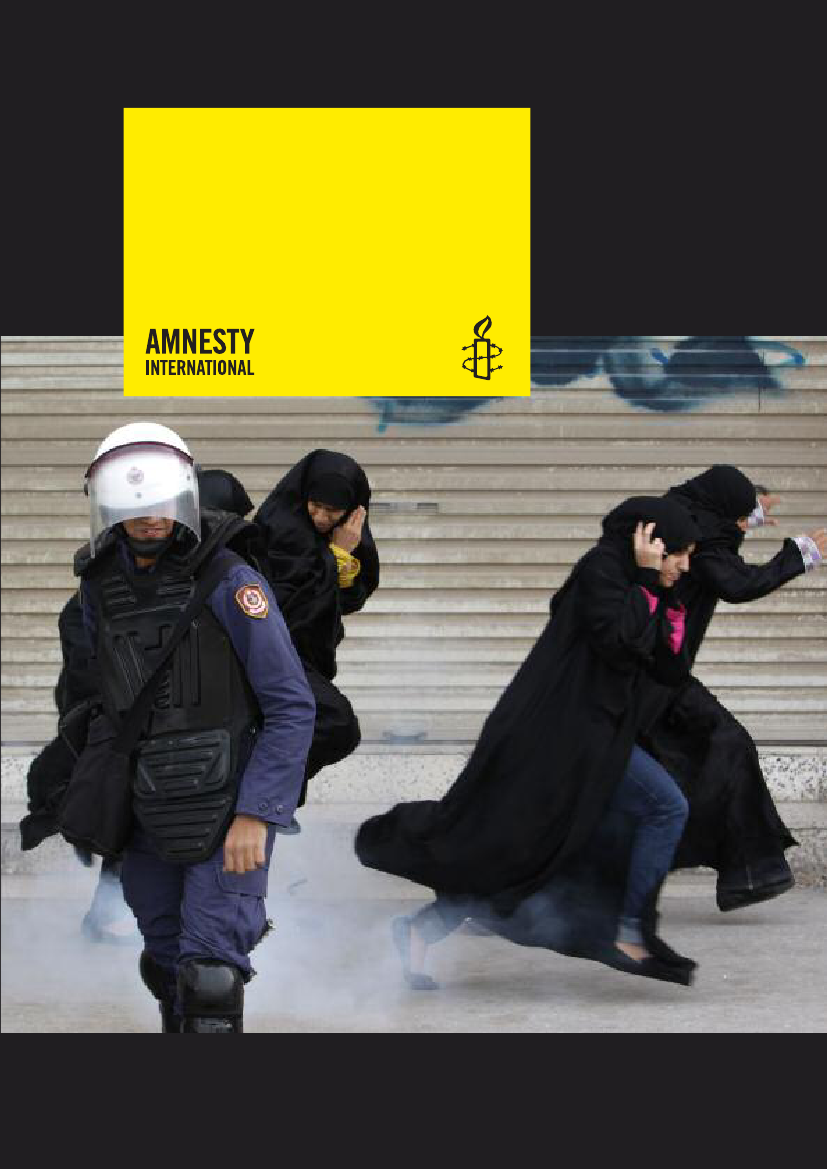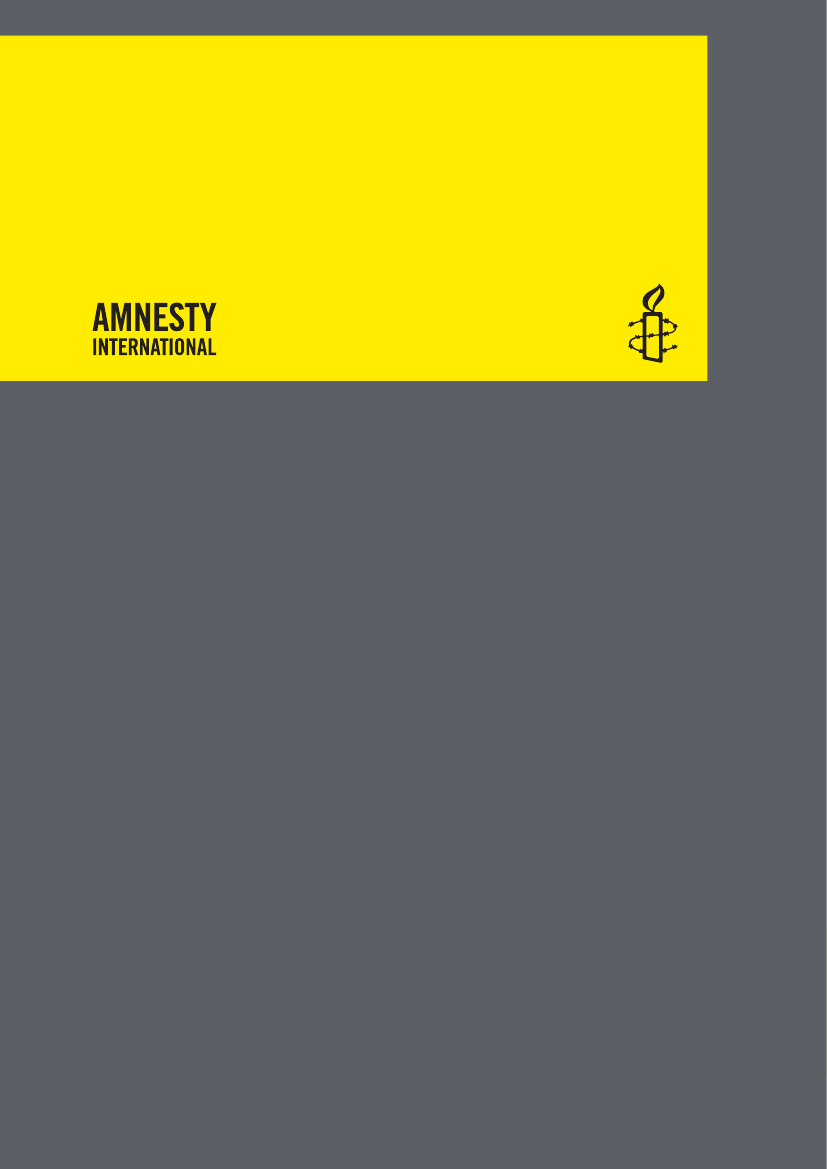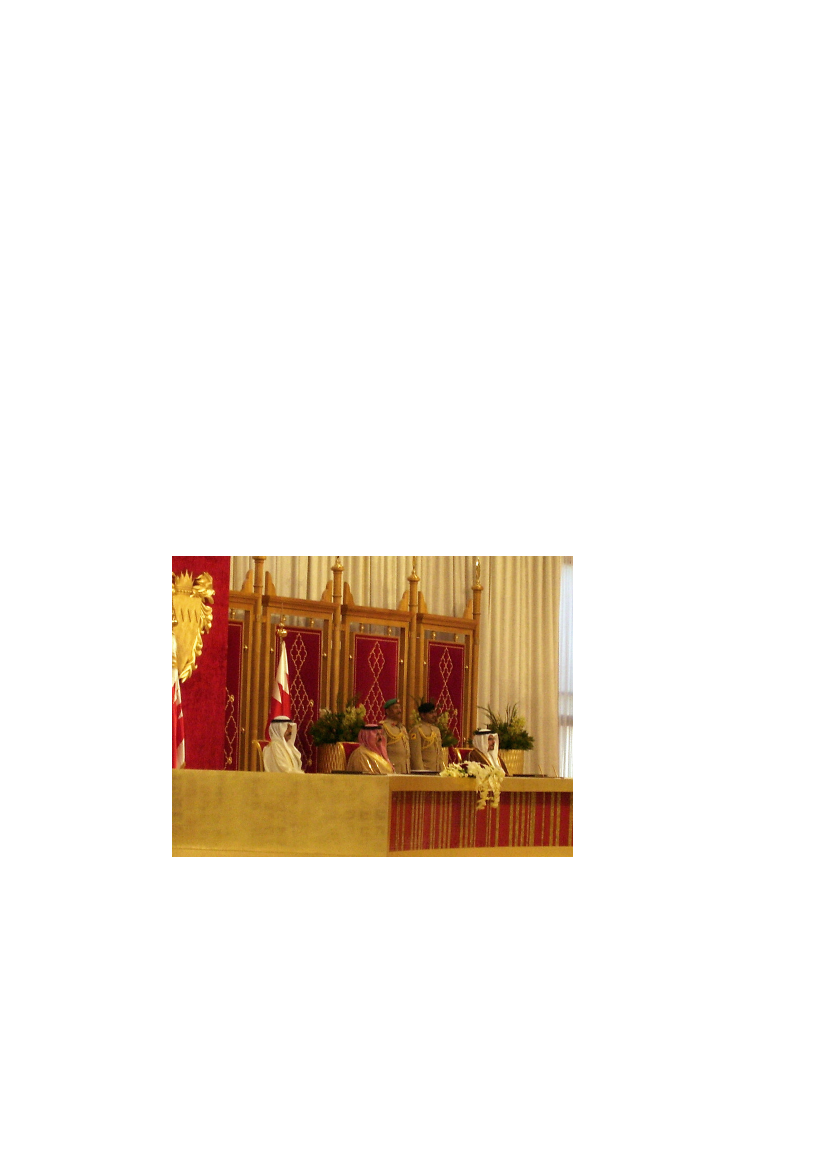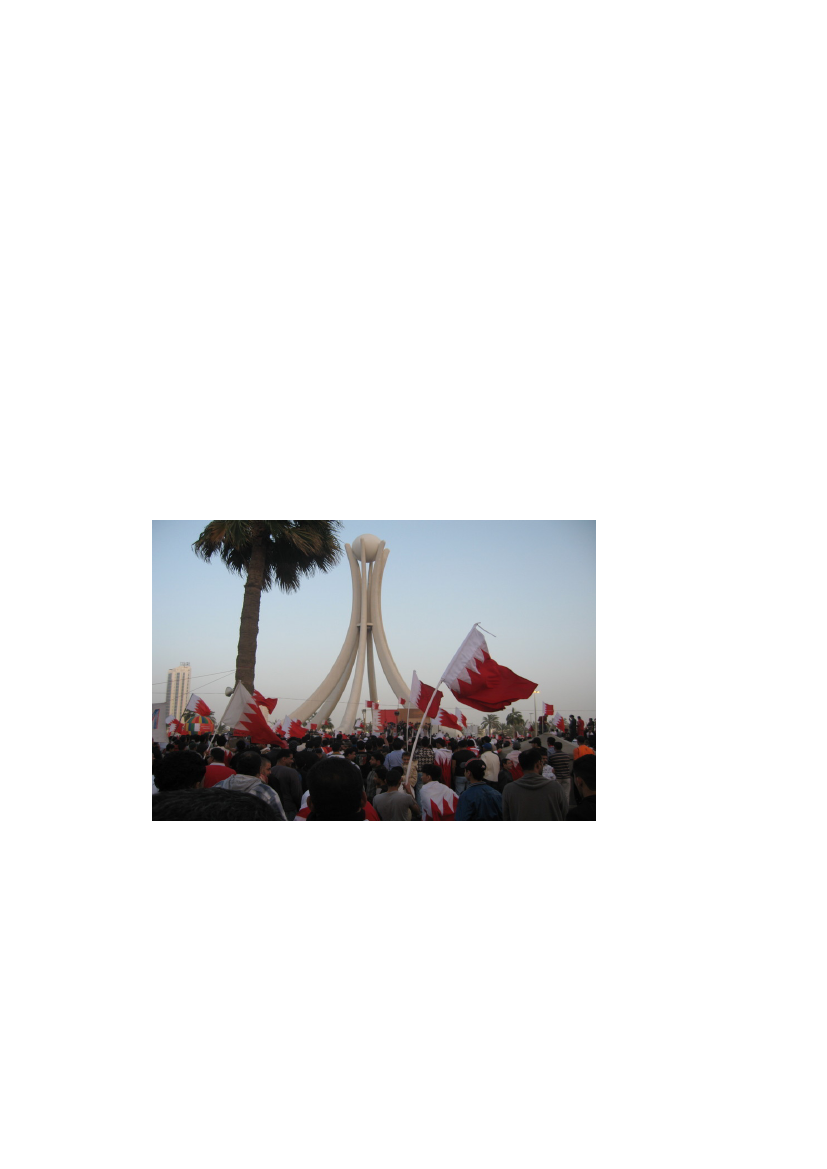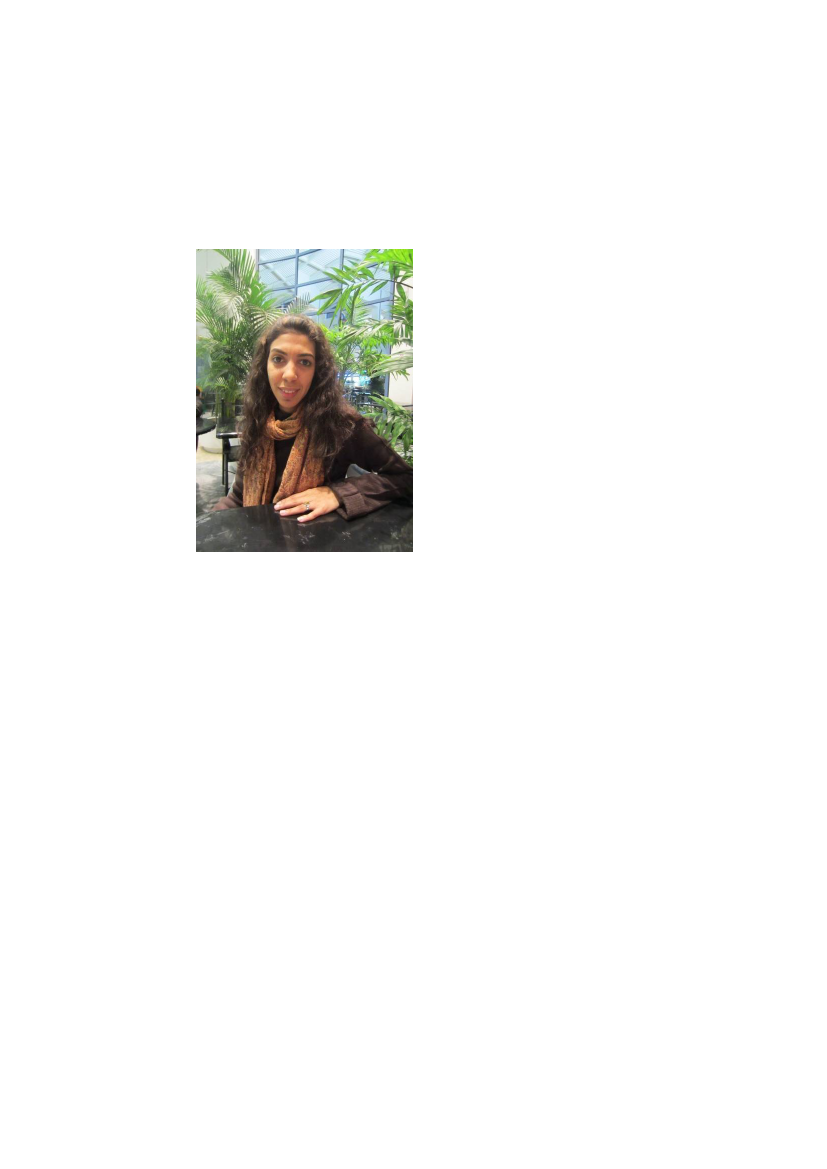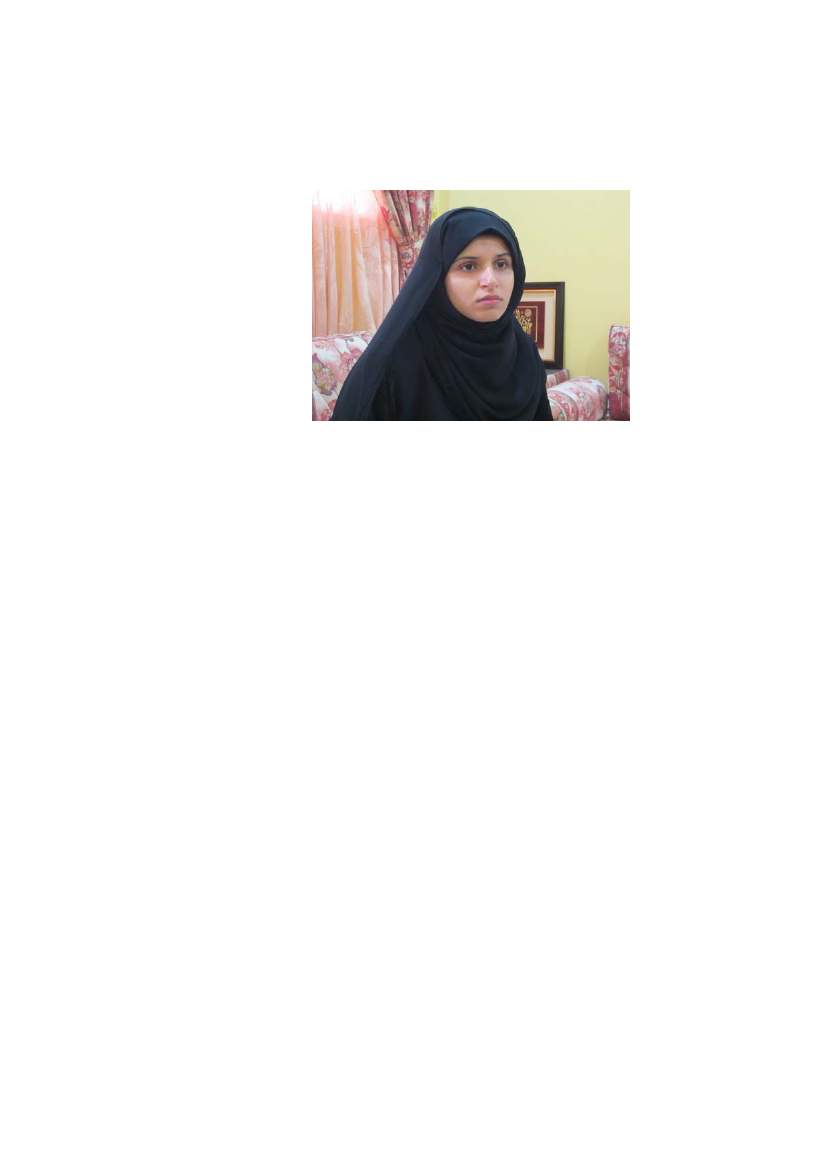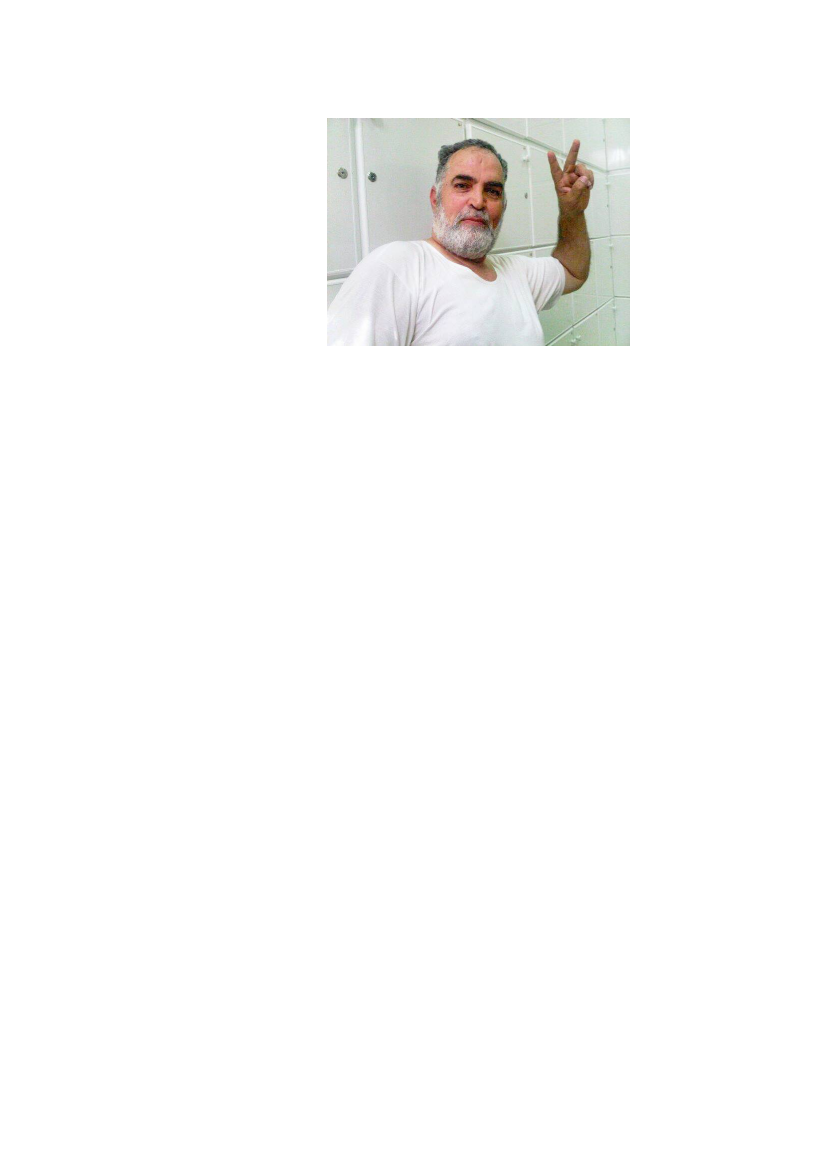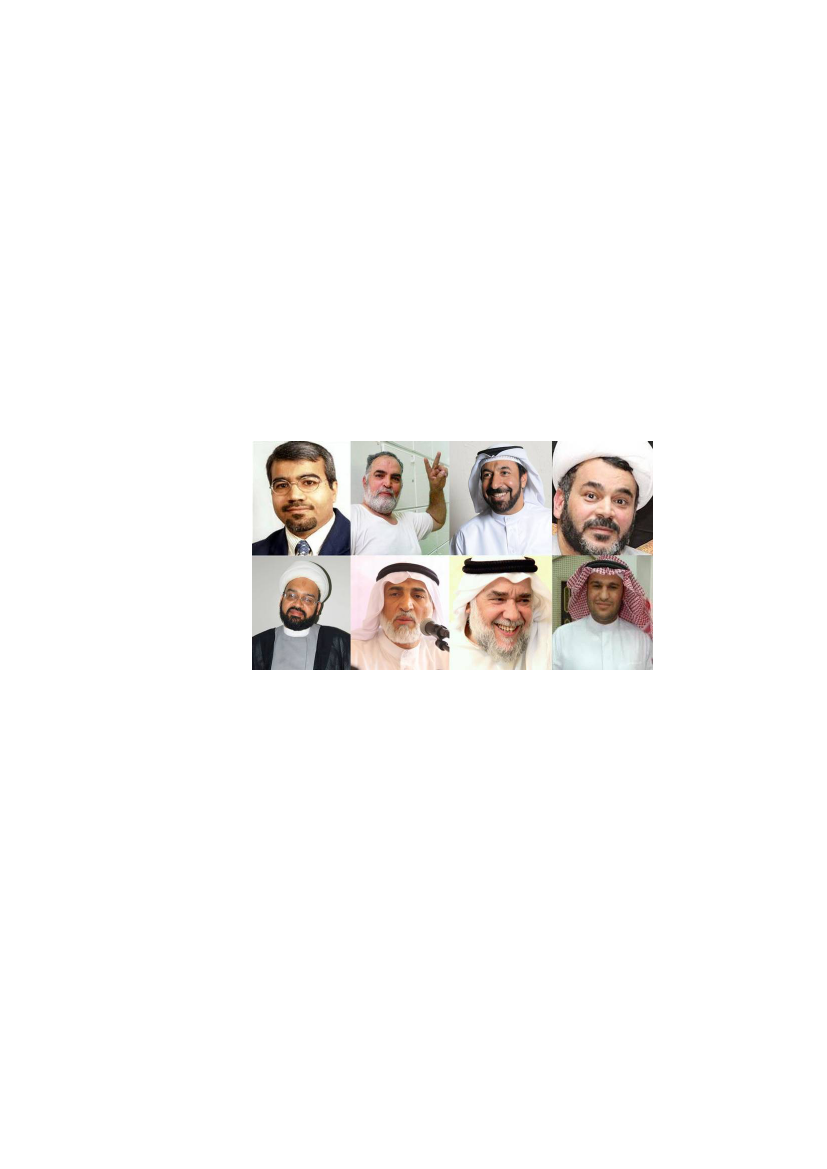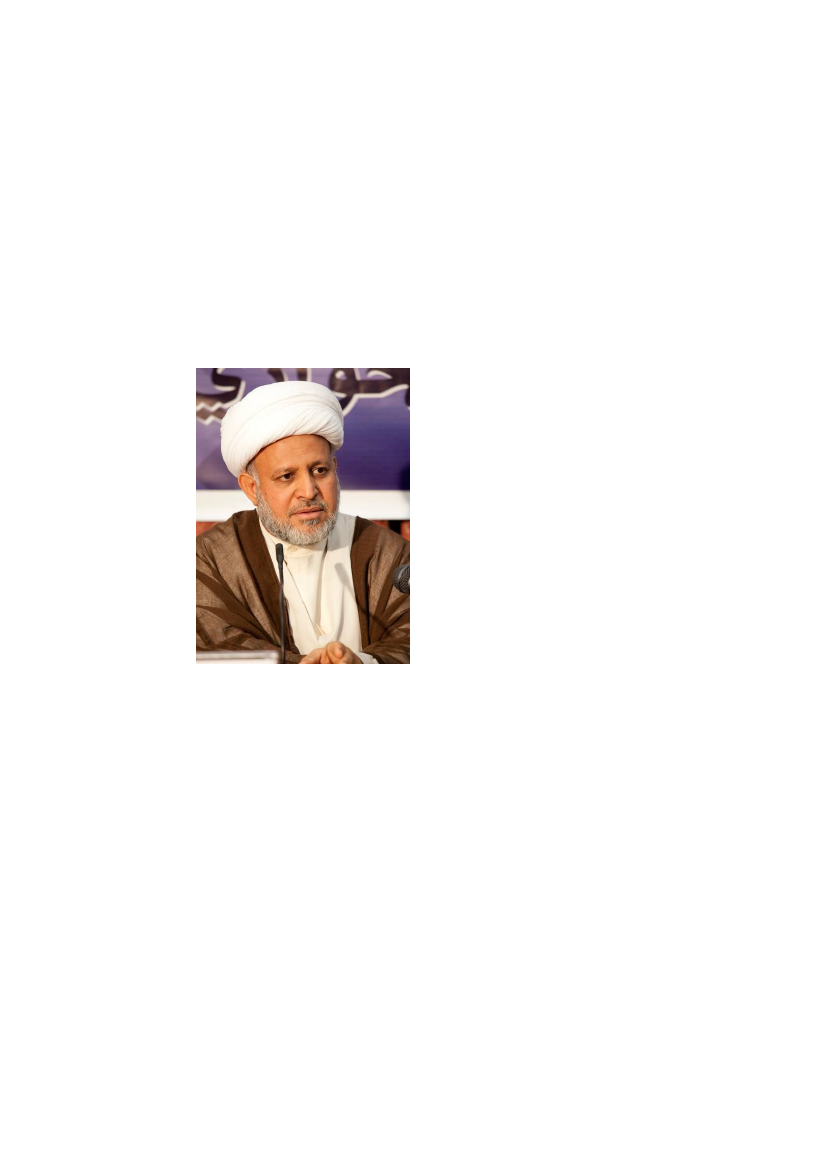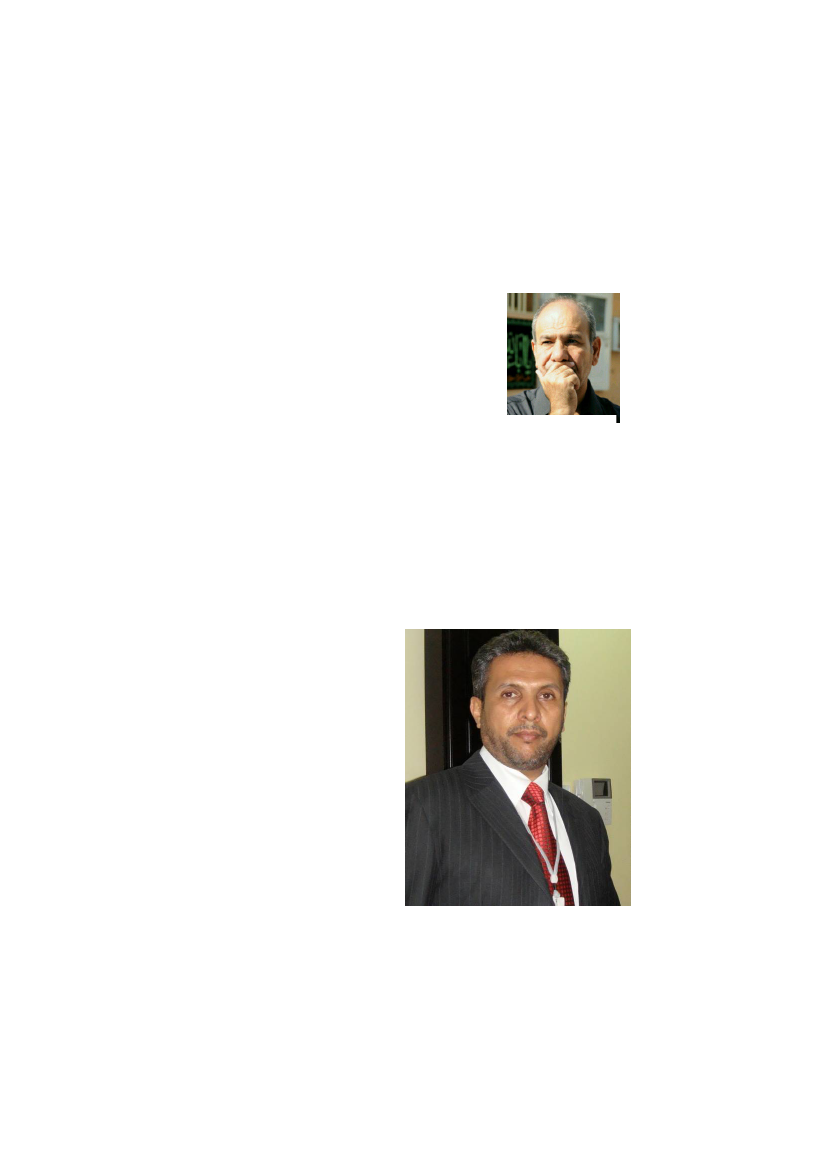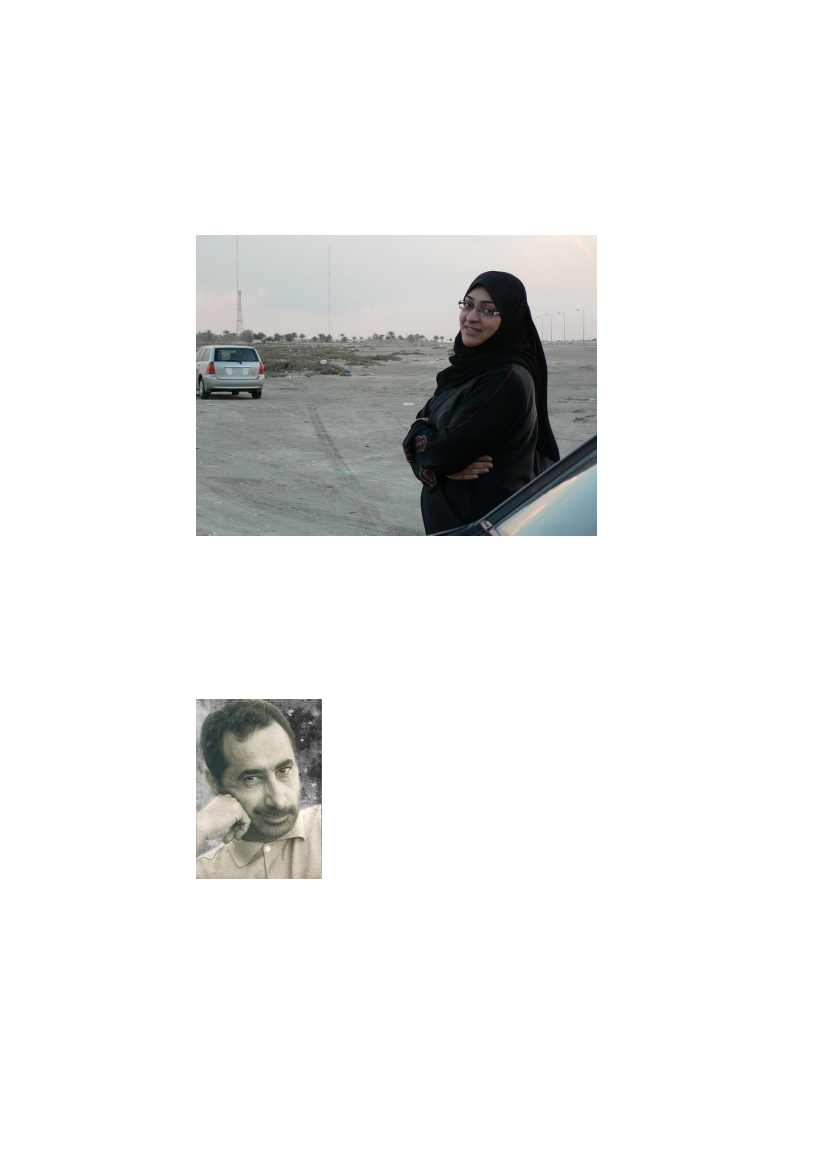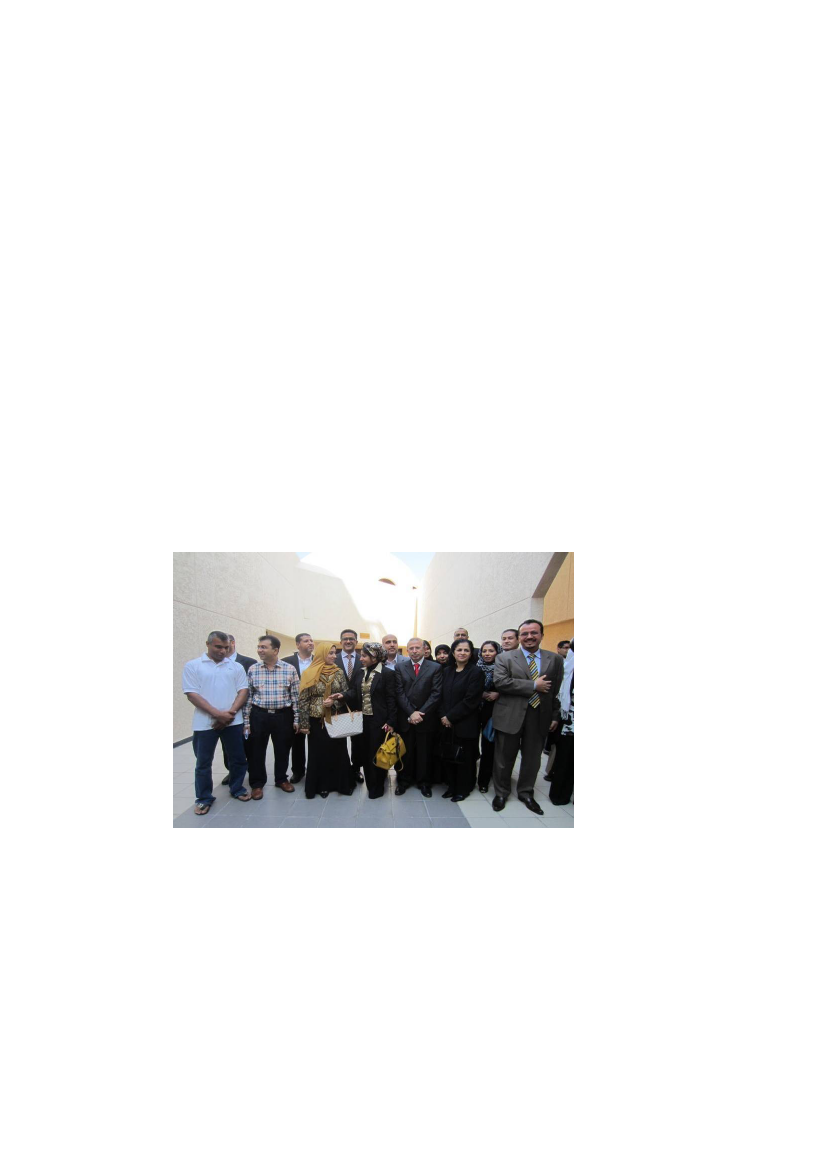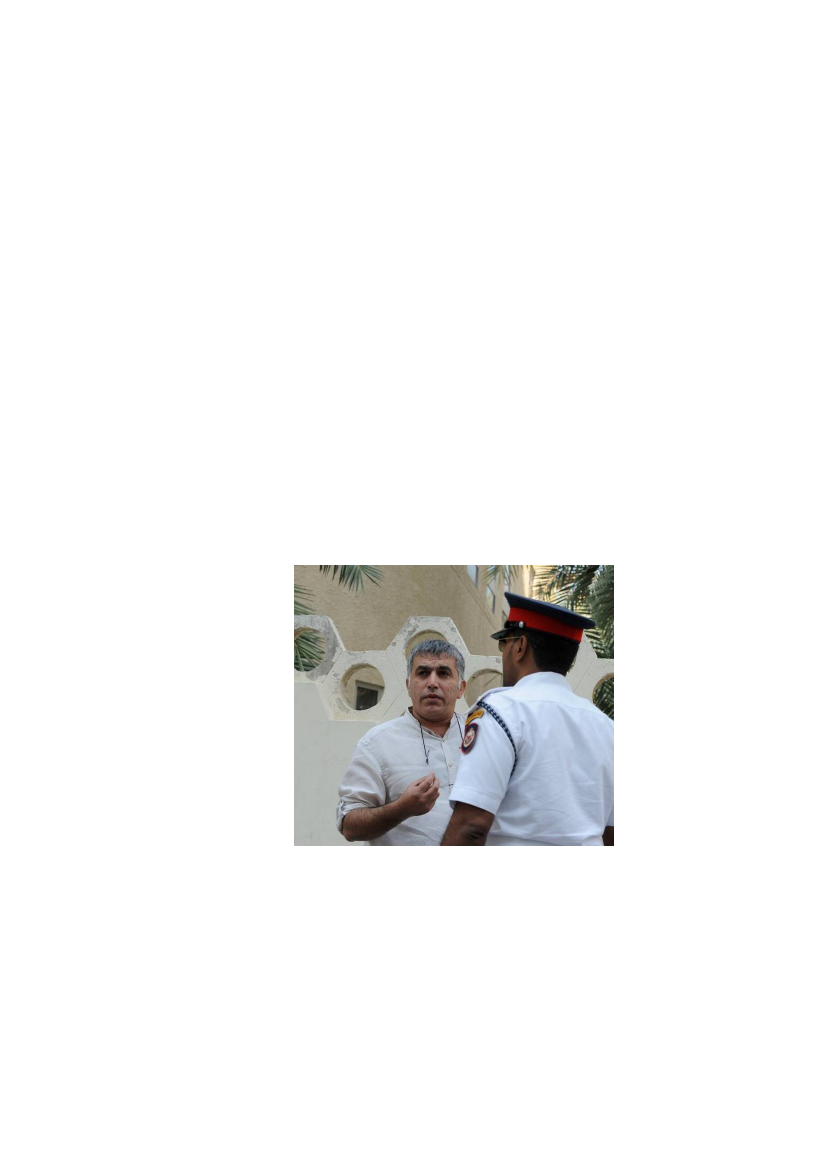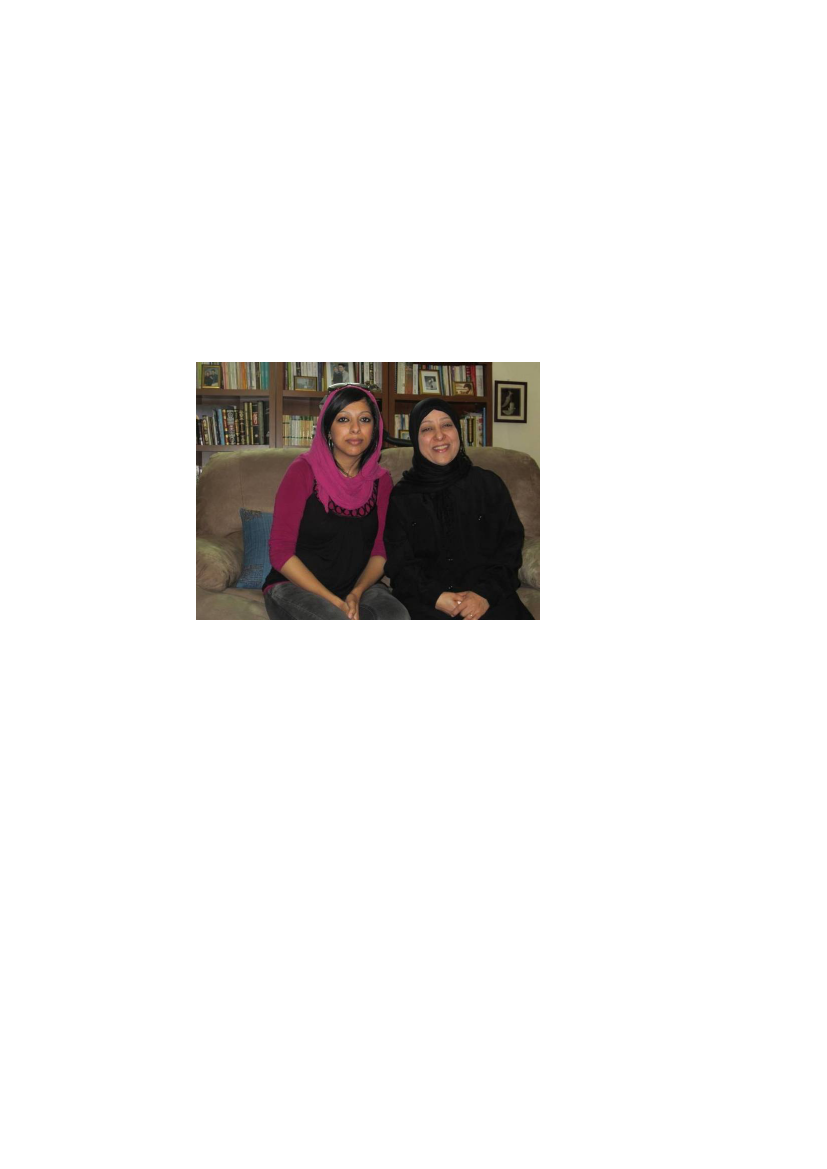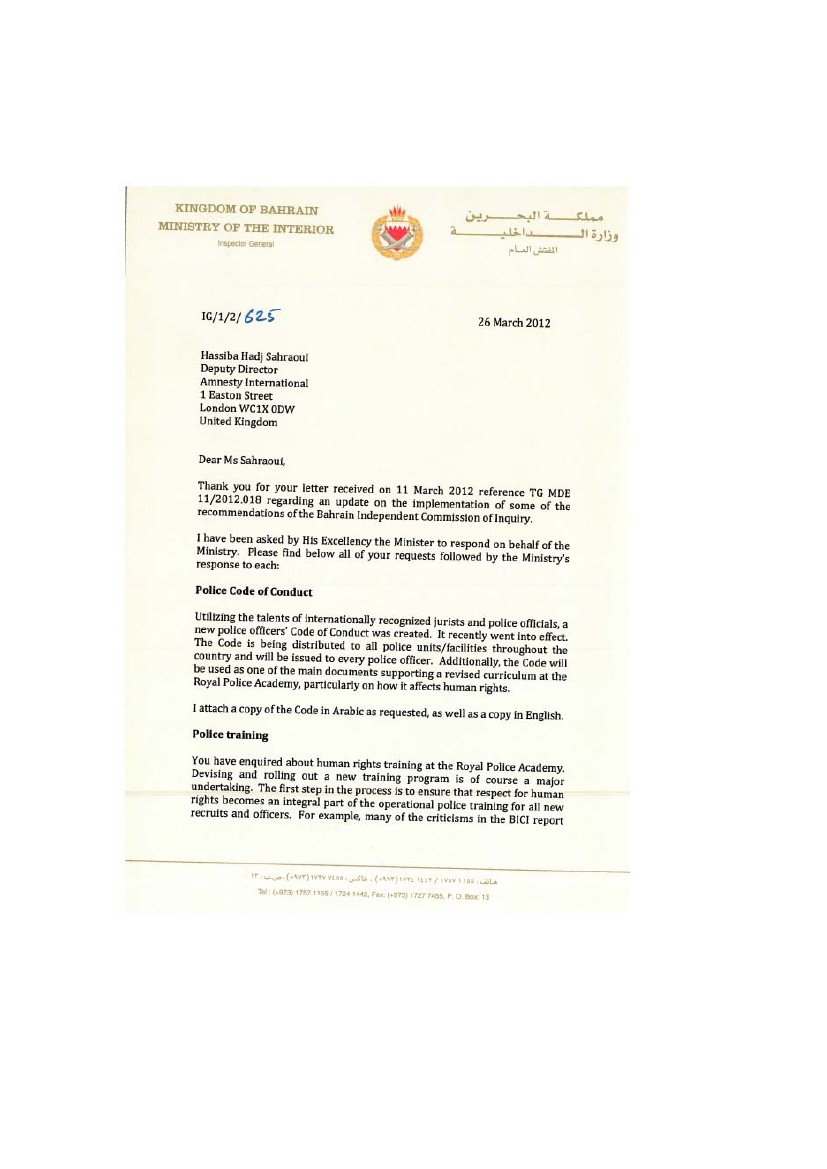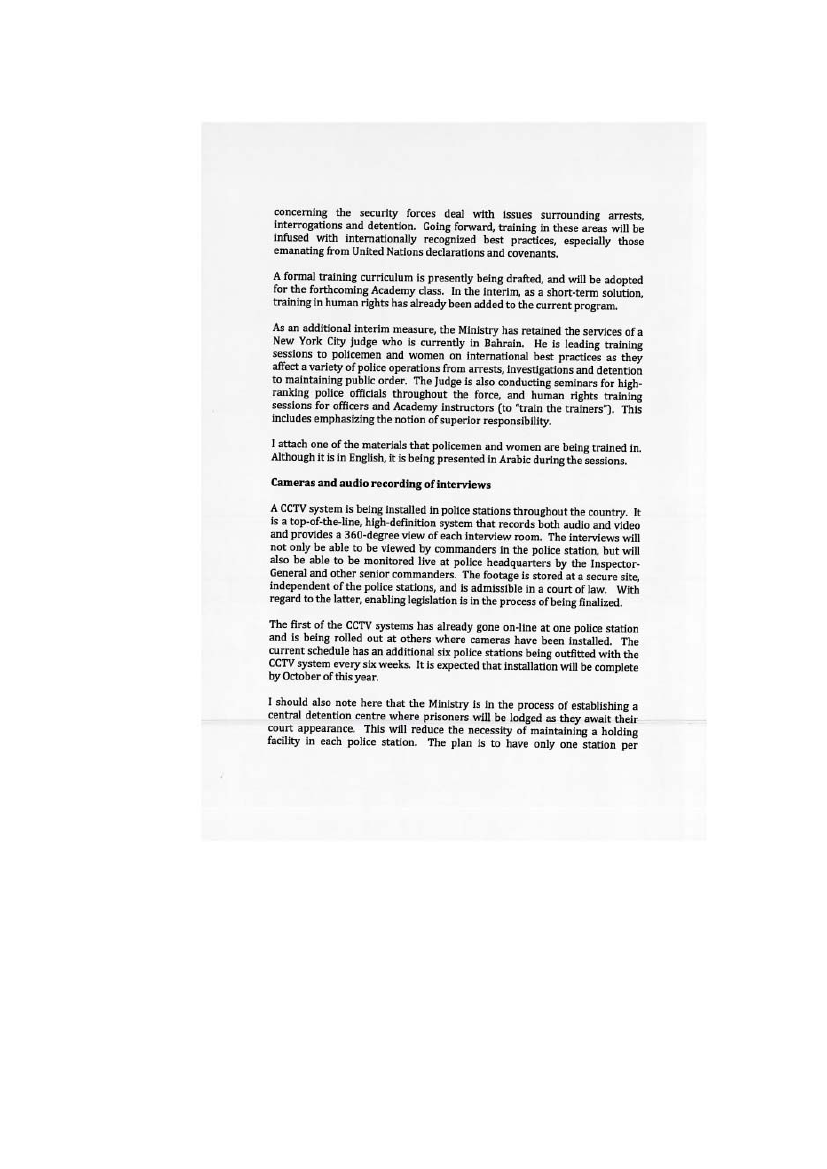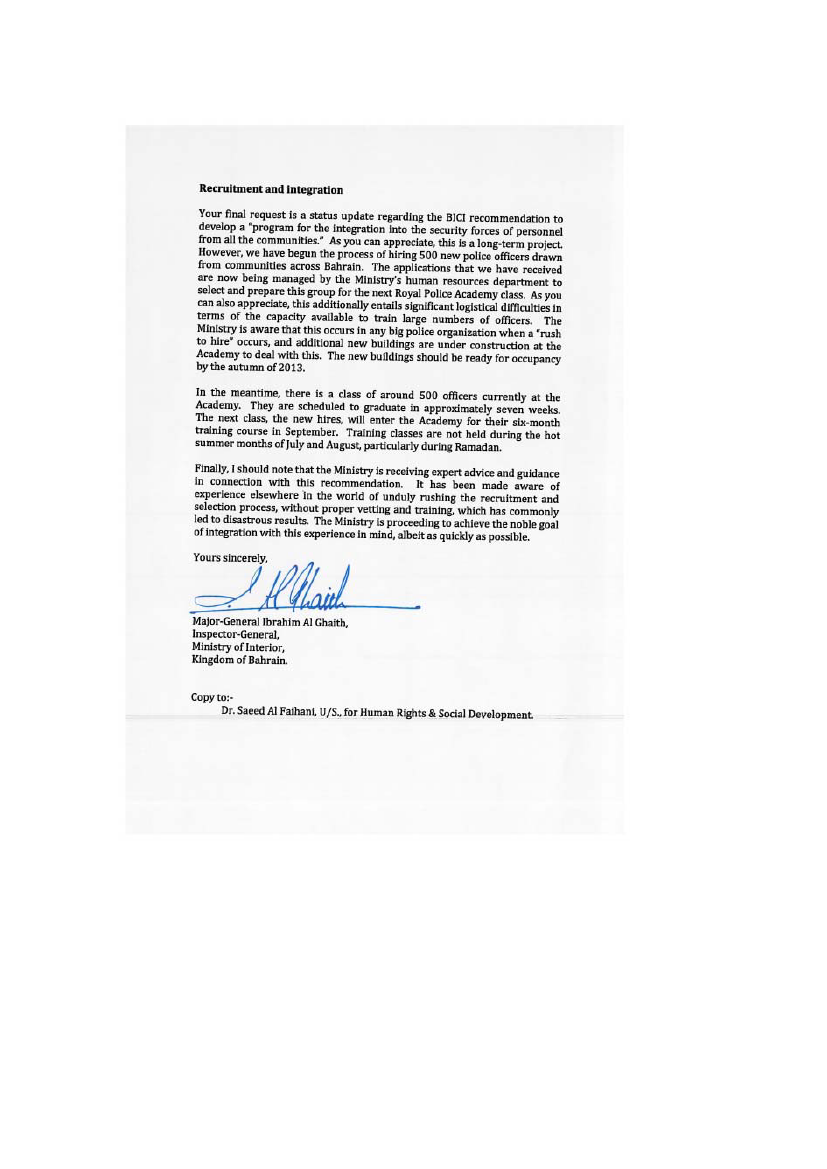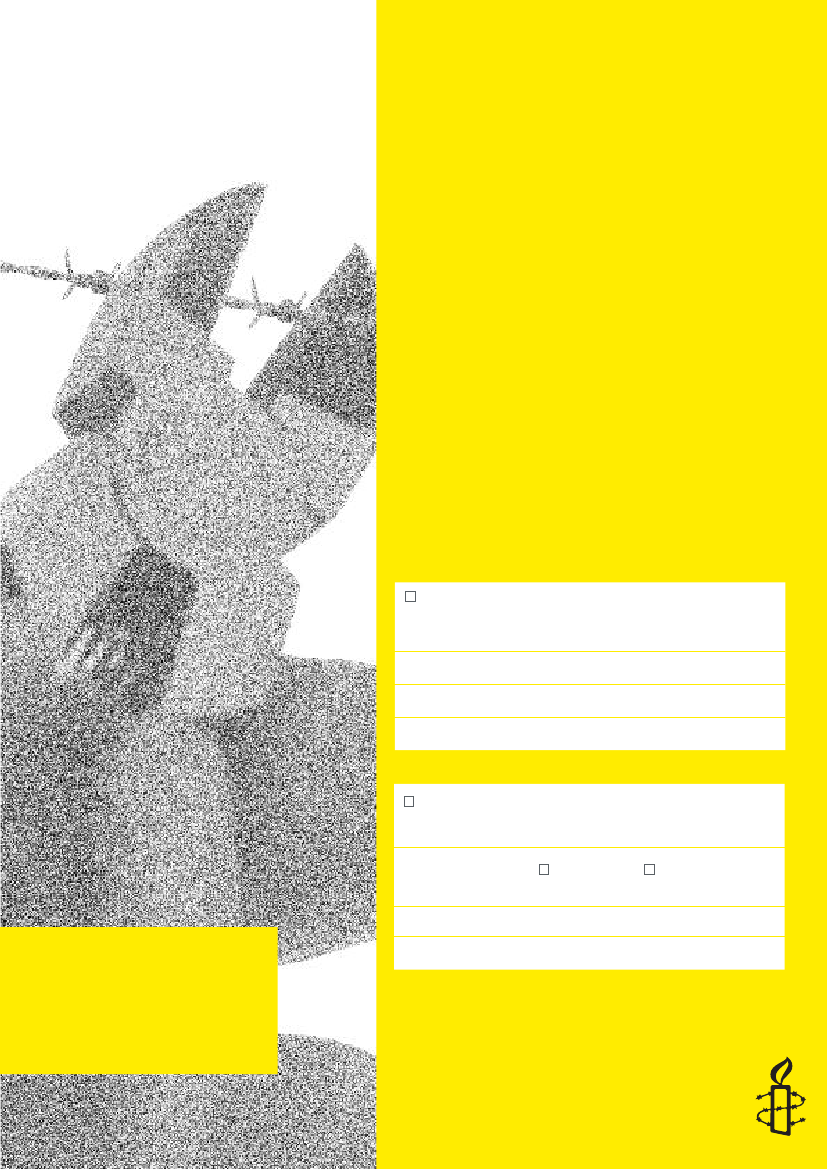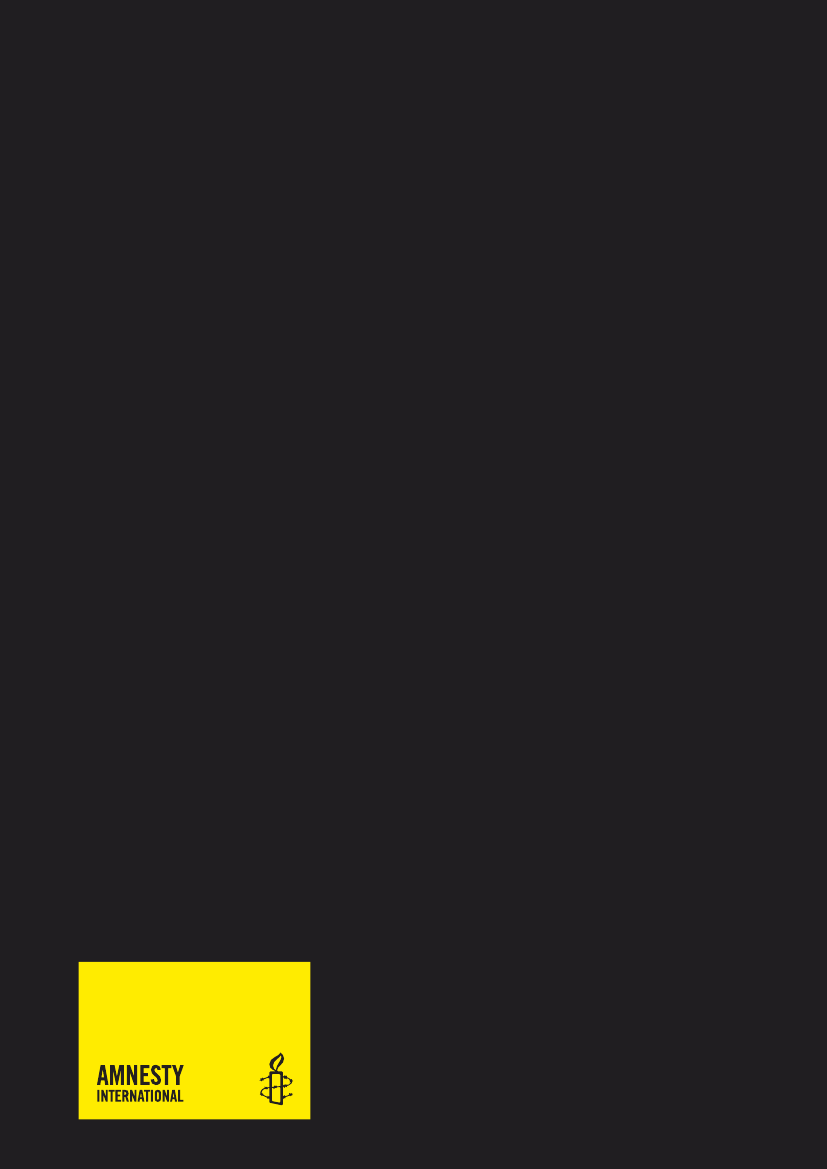Det Udenrigspolitiske Nævn 2011-12, Udenrigsudvalget 2011-12
UPN Alm.del Bilag 204, URU Alm.del Bilag 192
Offentligt
BAhrAIn fAIls to AchIEvE justIcEfor protEstErs
Flawed reForms
amnesty international is a global movement of more than 3 million supporters,members and activists in more than 150 countries and territories who campaignto end grave abuses of human rights.our vision is for every person to enjoy all the rights enshrined in the universaldeclaration of human rights and other international human rights standards.we are independent of any government, political ideology, economic interest orreligion and are funded mainly by our membership and public donations.
First published in 2012 byamnesty international ltdpeter Benenson house1 easton streetlondon wc1X 0dwunited Kingdom� amnesty international 2012index: mde 11/014/2012 englishoriginal language: englishprinted by amnesty international,international secretariat, united Kingdomall rights reserved. this publication is copyright, but maybe reproduced by any method without fee for advocacy,campaigning and teaching purposes, but not for resale.the copyright holders request that all such use be registeredwith them for impact assessment purposes. For copying inany other circumstances, or for reuse in other publications,or for translation or adaptation, prior written permission mustbe obtained from the publishers, and a fee may be payable.to request permission, or for any other inquiries, pleasecontact [email protected]Cover photo:Bahraini anti-government protesters react as riotpolice throw sound bombs at their feet to disperse them inQadam, Bahrain, 17 February 2012.� ap photo/hasan jamali
amnesty.org
CONTENTSTT1. Introduction..........................................................................................................5February-March 2011 protests ....................................................................................6Piecemeal reforms .....................................................................................................8Lack of political will.................................................................................................10About this report......................................................................................................112. Mechanism for implementing recommendations .........................................................133. Accountability for violations during protests ...............................................................15Deaths in custody and killing of civilians....................................................................17Tortured in custody ..................................................................................................194. Unfair trials of political activists ...............................................................................24National Safety Court cases ......................................................................................26Death sentences ......................................................................................................335. Continuing violations by police in the midst of reforms................................................35Excessive use of force ..............................................................................................36Arbitrary detention and torture and other ill-treatment .................................................396. Workers and students dismissed, punished ................................................................43Waiting to return to work ..........................................................................................447. Compensation to the victims ....................................................................................478. Prospects for reconciliation ......................................................................................499. International human rights groups and foreign journalists restricted .............................52
10.
Conclusion and recommendations ...................................................................... 54
Endnotes ................................................................................................................... 58Annex ....................................................................................................................... 65
Flawed reformsBahrain fails to achieve justice for protesters
5
1. INTRODUCTION“The Bahraini authorities need to urgently takeconfidence-building measures includingunconditionally releasing those who wereconvicted in military tribunals or are still awaitingtrial for merely exercising their fundamentalrights to freedom of expression and assembly.”UN High Commissioner for Human Rights Navanethem (Navi) Pillay, 21 December 2011
The human rights crisis in Bahrain is not over. Despite the authorities’ claims to the contrary,state violence against those who oppose the Al Khalifa family rule continues, and in practice,not much has changed in the country since the brutal crackdown on anti-governmentprotesters in February and March 2011.
The King, the Prime Minister and the Crown Prince during the Bahrain Independent Commission ofInquiry's ceremony � Amnesty International
Index: MDE 11/014/2012
Amnesty International April 2012
6
Flawed reformsBahrain fails to achieve justice for protesters
The Bahraini authorities have been vociferous about their intention to introduce reforms andlearn lessons from events in February and March 2011. In November 2011, the BahrainIndependent Commission of Inquiry (BICI), set up by King Hamad bin ‘Issa Al Khalifa,submitted a report of its investigation into human rights violations committed in connectionwith the anti-government protests. The report concluded that the authorities had committedgross human rights violations with impunity, including excessive use of force againstprotesters, widespread torture and other ill-treatment of protesters, unfair trials and unlawfulkillings.So far, however, the government’s response has only scratched the surface of these issues.Reforms have been piecemeal, perhaps aiming to appease Bahrain’s international partners,and have failed to provide real accountability and justice for the victims. Human rightsviolations are continuing unabated. The government is refusing to release scores of prisonerswho are incarcerated because they called for meaningful political reforms, and is failing toaddress the Shi’a majority’s deeply-seated sense of discrimination and politicalmarginalization, which has exacerbated sectarian divides in the country.In recent months, the Bahraini authorities have become more concerned with re-buildingtheir image and investing in public relations than with actually introducing real human rightsand political reforms in their country. Indeed, for the authorities, much is at stake. They arekeen to portray Bahrain as a stable and secure country in order to stave off internationalcriticism. But as the country is about to host the Formula 1 Grand Prix on 20-22 April, afterthe event was cancelled last year in response to the instability in the country, daily anti-government protests continue to be violently suppressed by the riot police that use tear gasrecklessly and with fatal results. Acts of violence by some protesters against the police havealso considerably increased in the last three months.Holding the Grand Prix in Bahrain in 2012 risks being interpreted by the government ofBahrain as symbolizing a return to business as usual. The international community must notturn a blind eye to the ongoing human rights crisis in the country. The government mustunderstand that its half-hearted measures are not sufficient - sustained progress on realhuman rights reform remains essential.
FEBRUARY-MARCH 2011 PROTESTSOn 14 February 2011, inspired by the uprisings in Egypt, Tunisia and other countries in theMiddle East and North Africa, tens of thousands of Bahrainis took to the streets to voice theirdemands. The vast majority of protesters were Shi’a Muslims, who despite being the majorityof Bahrain’s population, have resented being politically marginalized and discriminatedagainst by the ruling Sunni Al Khalifa family which dominate all aspects of political andeconomic life in Bahrain.The government’s response to the protests was brutal. The security forces used excessiveforce, including shotguns and live ammunition as well as the reckless use of tear gas, todisperse protesters who mostly camped in the Pearl Roundabout in the capital Manama.Seven protesters were killed by the security forces in the first week alone in February 2011.
Amnesty International April 2012
Index: MDE 11/014/2012
Flawed reformsBahrain fails to achieve justice for protesters
7
As demonstrations continued to grow, negotiations between the opposition, led by Bahrain’slargest Shi’a political organization, the al-Wefaq Society, and the royal family, led by CrownPrince Shaikh Salman bin Hamad Al Khalifa, collapsed in early March 2011.1The oppositionreportedly had demanded that the government resign before negotiations could take place.Al-Wefaq’s 18 members of parliament resigned in February 2011 in protest against policebrutality.After the first week of March 2011, anti-government protesters began to organize peacefulmarches to key government buildings. Many were openly calling for an end to the monarchyin Bahrain, and for a republican system to be established instead. Thousands went on strike.With members of the Sunni community going on large pro-government rallies, sectarianrelations in the country became extremely tense, and violence ensued. On 12 March 2011,thousands of anti-government protesters marched to the Royal Court in al-Riffa’a. The marchturned violent amid reports that government supporters armed with knives and sticks wereplanning to prevent the demonstrators from approaching the Royal Court. A day later, the twosides violently clashed at Bahrain University.13 March 2011 brought a further escalation in violence when anti-government protesterssealed off the main roads in Manama and occupied the capital’s Financial Harbour area,causing considerable disruption. The anti-government protests were by and large peaceful,but there were a few violent incidents. Some anti-government protesters attacked Asianmigrant workers, killing two and injuring others.
Bahrain demonstration, 22 February 2011 � Amnesty International
On 15 March 2011, Saudi Arabia sent at least 1,200 troops to Bahrain across the causewaylinking the two states, reportedly at the request of the Bahraini government. The same day,the King of Bahrain declared a three-month state of emergency, known as the State ofNational Safety, and gave the security forces sweeping powers to arrest and detain protesters
Index: MDE 11/014/2012
Amnesty International April 2012
8
Flawed reformsBahrain fails to achieve justice for protesters
and ban all protests. On 16 March 2011, security forces, backed by helicopters and armytanks, stormed the Pearl Roundabout area and evicted the protesters by force. At least twoprotesters and two police officers were reported killed and dozens of people were injured.Protesters were also forced out of the nearby Financial Harbour area. The Pearl Monument,which had become a symbol for the pro-reform protesters, was torn down.Manama’s main hospital, the Salmaniya Medical Complex, also became a target. The securityforces stormed it and took control of the hospital. Many wounded protesters weresubsequently too afraid to go there for treatment. Some of those who did were detained.In the weeks that followed, hundreds of activists, including opposition leaders, medicalworkers, teachers, journalists and students were rounded up and detained. Most werearrested at dawn, without arrest warrants, and held incommunicado in police stations or atthe Criminal Investigations Directorate (CID) in Manama. Many said that they were tortured orotherwise ill-treated during interrogation. At least five people died in custody as a result oftorture. Detainees were forced to sign “confessions”, which were then used against them incourt. Hundreds of people were later tried by the National Safety Court, a military courtestablished under the state of emergency, and sentenced to prison terms, including lifeimprisonment, after grossly unfair trials.At least 35 people died during the February-March protests, including five security officers.More than 4,000 people, among them teachers, students and nurses, were dismissed fromtheir jobs or university positions for taking part in the anti-government protests.About 38 Shi’a mosques were demolished in the aftermath of the February-March events.The government has argued that these mosques had been built illegally, but the timing of thedemolitions led many in the Shi’a community to believe that this mass demolition wascollective punishment for the unrest.
PIECEMEAL REFORMSKeen to pacify the international community about the government’s crackdown, particularlyover allegations of torture and deaths in custody, the King lifted the state of emergency on 1June 2011. On 29 June 2011, the King decreed that the National Safety Court, which hadalso attracted international criticism, would no longer deal with cases linked to the February-March protests. However, the National Safety Court continued to function for feloniesconsidered to be the most serious crimes until early October 2011, when all cases werefinally transferred to civilian courts. The National Safety Court closed down after convictinghundreds of people following unfair proceedings.The King’s most noteworthy response to international pressure was setting up the BahrainIndependent Commission of Inquiry (BICI). In an unprecedented step, the authoritiesappointed five renowned international legal and human rights experts2to investigate humanrights violations committed in connection with the protests. On 23 November 2011, to muchmedia fanfare, BICI Chairman Professor Mahmoud Cherif Bassiouni, submitted theCommission’s report to the King. According to the report, the BICI had examined more than8,000 complaints; interviewed more than 5,000 people, including detainees; and visitedvarious prisons, detention centres and the Salmaniya Medical Complex in Manama.
Amnesty International April 2012
Index: MDE 11/014/2012
Flawed reformsBahrain fails to achieve justice for protesters
9
The report concluded that dozens of detainees had been tortured by security officials,including by members of the National Security Agency (NSA), who believed they could actwith impunity; that police and other security forces had repeatedly used excessive forceagainst protesters, resulting in unlawful killings; and that proceedings before the NationalSafety Court did not meet international standards for fair trial. The BICI made variousimportant recommendations, including the establishment of an independent human rightsbody to investigate all torture allegations, deaths in custody as a result of torture, killings ofprotesters and bystanders during the protests and other human rights violations. It alsorecommended that all those responsible be brought to account, including high-rankingmembers of the government, security forces and the army who gave orders to commit suchhuman rights violations. Other recommendations included rebuilding demolished Shi’amosques; establishing a national reconciliation programme to address the grievances ofgroups which felt marginalized or discriminated against; ending discrimination against Shi’ain the security forces and preventing incitement to hatred by the government-controlledmedia. The King accepted the findings of the report, and publicly expressed thegovernment’s commitment to implement all its recommendations.The Bahraini government has so far failed to ensure accountability that guarantees truth,justice and adequate reparation for the victims of arbitrary arrests, torture and unfair trials,as well as for those injured during protests, or the relatives of those killed. In response to theBICI recommendations, the government set up a new investigative unit within the PublicProsecutor’s Office (PPO). Lacking independence and impartiality, the new unit is unlikely todeliver real accountability. Only 11 low-ranking police and security officers, including fivePakistanis and a Yemeni national, are currently being tried for their part in specific humanrights violations committed during and after the February and March 2011 protests. On 21March 2012, a day after the King received the report by the BICI, the Public Prosecutor wasquoted in the Bahrain News Agency as saying that 50 policemen were being or were about tobe tried in connection with torture and other abuses.Hundreds of protesters are still in prison after being detained, tried unfairly by militarycourts, and receiving harsh prison sentences. Dozens have been imprisoned for life. Many ofthem are prisoners of conscience, punished solely for leading or participating in anti-government demonstrations, and did not use or advocate violence. They include 14 leadingopposition figures and a prominent trade unionist. Among them is prominent human rightsdefender ‘Abdulhadi Al-Khawaja, who is said to be nearing death as he continues his hungerstrike in protest at his imprisonment.The government’s promise to reinstate all those who were dismissed from work or universityfor participating in protests is yet to be fulfilled. At the time of writing, more than 200 peoplestill have not been allowed to return to their jobs. Many of those who have returned havecomplained of various administrative sanctions, such as a change of position or loss ofincrements. Only five out of the at least 38 Shi’a mosques that were demolished by thegovernment last year are being reconstructed.The government has not taken any steps to tackle discrimination or incitement to hatred, orwork towards real reconciliation between the ruling family and the Shi’a population.
Index: MDE 11/014/2012
Amnesty International April 2012
10
Flawed reformsBahrain fails to achieve justice for protesters
There have been some positive institutional and other reforms within the Bahraini police. Thegovernment has introduced a new code of conduct, established a new office in the Ministry ofInterior, dedicated to investigating complaints against the police, and embarked on humanrights training for police officers.In practice, however, the security forces remain unaffected by these institutional changes.They continue to respond to protesters with unnecessary and excessive force, particularly thereckless use of tear gas which has resulted in several deaths in recent months. AmnestyInternational is still receiving reports of torture and other ill-treatment. With calls for reformsand social justice continuing, the numbers of deaths had reached at least 60 by April 2012.The government has taken some potentially positive steps in reviewing, or proposing to reviewcertain provisions in the Criminal Procedure Code and the Penal Code. Such steps are longoverdue as many provisions in Bahrain’s domestic legislation, including the Penal Code, donot comply with a number of international human rights treaties to which it is state party.These include, the International Covenant on Civil and Political Rights (ICCPR); theInternational Convention on the Elimination of All Forms of Racial Discrimination (ICERD),the UN Convention on the Rights of the Child (CRC); and the UN Convention against Tortureand Other Cruel, Inhuman or Degrading Treatment or Punishment (CAT).3The Bahrainigovernment is required to honour its obligations under these and other human rights treatiesit is a party to. Under these treaties, Bahrain is also required to investigate all allegedviolations of international human rights and humanitarian law and prosecute thoseresponsible. In ratifying these treaties, the Bahrain government promised both the people ofBahrain and the wider international community that it would uphold and respect theirprovisions. Bahrain’s international human rights commitments will be put under the spotlightin Geneva in May and June 2012 when the country’s rights record is assessed under theUniversal Periodic Review of the UN Human Rights Council.
LACK OF POLITICAL WILLThe government has recruited a number of foreign experts in international human rights law,policing and the media, with the ostensible aim of helping it understand and implement theBICI recommendations. Advisors have been hired by several ministries, including the Ministryof Interior and the Ministry of Human Rights and Social Development, as well as the PPO andthe Information Affairs Authority. The government has also hired a number of public relationsexperts to help it re-build its image internationally ahead of this year’s Grand Prix.Such steps will only lead to results if they are matched by the genuine will to reform and realcommitment toward human rights. However, so far the signs have not been encouraging.Despite welcoming international media and human rights groups to witness the King receivethe BICI report in November 2011, in January 2012, the government began to restrict theaccess of foreign journalists and human rights delegations. On 29 February 2012, a day afterthe Minister of Human Rights and Social Development solemnly announced to the UNHuman Rights Council that the UN Special Rapporteur on torture and other cruel, inhumanor degrading treatment or punishment would be visiting Bahrain from 8-17 March 2012, hisvisit was postponed, at the government’s request, until July 2012. Also in February 2012,Amnesty International was left with no choice but to cancel a visit to Bahrain because of newrestrictions to the way human rights groups are able to work in the country, only
Amnesty International April 2012
Index: MDE 11/014/2012
Flawed reformsBahrain fails to achieve justice for protesters
11
communicated at the last minute before a scheduled visit by the organization.The establishment of the BICI was a real breakthrough and raised expectations that thingswould be different in Bahrain. Yet, nearly five months later, real change has not materialized.People are still waiting for the significant changes that would demonstrate the political will toreform. The piecemeal nature of the reforms, and the persistence of some of the sameviolations documented in the BICI report, have cast a shadow over the whole process, andraised doubts over the authorities’ political will to reform.This Amnesty International report shows the discrepancy between the Bahraini government’spublic pronouncements and its failure to make real steps toward accountability for humanrights violations. In doing so, the report evaluates the government’s implementation of theBICI recommendations and for ease of reference follows the structure of the BICI report. Thereport highlights patterns of human rights violations committed by Bahraini security forcesand provides testimonies of victims of human rights violations who are still awaiting justice.In its conclusion, Amnesty International calls on the Bahraini government to show realpolitical will for reform in the country and makes a series of recommendations to the Bahrainigovernment, key of which are:
Immediately and unconditionally release all prisoners of conscience who were tried andsentenced by the National Safety Court, or ordinary criminal courts, solely for peacefullyexercising their rights to freedom of expression and assembly, including the 14 prominentleaders of the opposition;
Set up prompt, thorough, impartial independent investigations (by an independent bodyoutside the PPO) into all allegations of torture, deaths in custody and unlawful killings,including those resulting from unnecessary and excessive use of force, committed since thebeginning of the February 2011 protests;
Ensure that all those suspected of torture and unlawful killing, including those withcommand responsibility, or those who condoned or committed torture, unlawful killings andother human rights violations, regardless of their position or status in the government andranking in the security and military forces, are held accountable, including in a trialconsistent with international fair trial guarantees and without recourse to the death penalty.
ABOUT THIS REPORTThis report is based on individual testimonies, including of victims of human rightsviolations, lawyers and human rights defenders, gathered by Amnesty International during afact-finding visit to Bahrain in November 2011. Unfortunately, its scheduled visit to Bahrainin March 2012 was cancelled following a communication by the Ministry of Human Rightsand Social Development of new restrictions imposed on international NGOs wishing to visitBahrain. Considering the late communication of such restrictions, Amnesty International feltunable to go ahead with its planned visit.The report also relies on official documents published by the government. AmnestyInternational has been unable to raise some of the concerns articulated in this report directlywith the authorities given its cancelled visit. However, the organization has continued to raise
Index: MDE 11/014/2012
Amnesty International April 2012
12
Flawed reformsBahrain fails to achieve justice for protesters
directly its concerns with the Bahraini authorities since the beginning of the human rightscrisis in the country. For the purpose of this report Amnesty International has addressed anumber of questions to the Ministry of Interior as well as to the Public Prosecutor. Answersprovided by the government of Bahrain are reflected in this report. Amnesty International isgrateful to all those individuals who met with or provided information to its delegates.Amnesty International also appreciates the time and assistance provided by Bahraini humanrights activists and civil society organizations.
Amnesty International April 2012
Index: MDE 11/014/2012
Flawed reformsBahrain fails to achieve justice for protesters
13
2. MECHANISM FOR IMPLEMENTINGRECOMMENDATIONSSignificantly, the first recommendation of the BICI report (No.1715)4calls for an impartialbody to drive and oversee the implementation process of its recommendations. A few daysafter 23 November 2011, when the BICI submitted its report, the King established theNational Commission to Follow Up on the Implementation of the Recommendations of BICI(the National Commission) and appointed its members (Royal Orders No.45 and No.48,issued on 26 and 28 November 2011 respectively). The Commission was made up of 19people, including the current Minister of Justice Shaikh Khaled bin ‘Ali Al Khalifa, who is amember of the royal family, and chaired by ‘Ali Bin Saleh al-Saleh, President of the ShuraCouncil, the upper house of Bahrain’s bicameral national assembly (parliament), whose 40members are appointed by the King, and a key Shi’a pro-government politician. The NationalCommission was to study the BICI recommendations and make suggestions on theirimplementation, as well as on amendments to Bahraini legislation. It was given until the endof February 2012 to complete its work in a “transparent way” and then to publish itsconclusions.5The Commission set up three working groups: the first to focus on legislativereform, the second to focus on human rights issues and the third to deal with nationalreconciliation issues.The lack of transparency in setting up the National Commission angered many in Bahrain,including main-stream opposition political organizations such as the al-Wefaq Society, aswell as human rights activists. Reportedly, the government confidentially contactedindividuals to invite them to join the National Commission. When two al-Wefaq formermembers of parliament were contacted in this way, the Society objected. Al-Wefaq thenrefused to join the National Commission, arguing that the way it was set up went against thecontent and spirit of BICI recommendation No.1715. Fifteen members of the NationalCommission are believed to be pro-government and, in addition to the Minister of Justice,they include actual and former members of parliament, businessmen, lawyers andacademics.The National Commission held weekly meetings to discuss its progress and regularlyrequested information from various ministries on their implementation of relevantrecommendations. On 31 December 2011 Chair ‘Ali Bin Saleh al-Saleh submitted a letter ofresignation to the King in response to attacks in the media. The letter was published innewspapers in Bahrain.Some pro-government figures had attacked ‘Ali Bin Saleh al-Saleh, in the media and duringmosque sermons, for helping four members of the Shura Council back into the Council afterthey were dismissed because of their participation in anti-government protests in Februaryand March 2011.6However, ‘Ali Bin Saleh al-Saleh’s resignation was not accepted and hecontinued in his position. On 2 March 2012, the King extended the mandate of the NationalCommission until 20 March 2012 (Royal Order 9 for 2012).7The National Commissionsubmitted its report to the King in a ceremony hosted by the King and the Crown Prince andattended by foreign diplomats and the media.
Index: MDE 11/014/2012
Amnesty International April 2012
14
Flawed reformsBahrain fails to achieve justice for protesters
The King invited BICI Chairman Professor Mahmoud Cherif Bassiouni to Bahrain in earlyFebruary 2012 to prepare a report on how the BICI recommendations had been implementedby the government. Professor Mahmoud Cherif Bassiouni was due to submit his report at theend of March 2012, but as of 10 April 2012 it was not known if he had submitted it or not.The National Commission’s report, submitted on 20 March 2012, includes correspondencebetween the Head of the Commission and the various government ministries on theimplementation of BICI recommendations relevant to their ministries. The report alsoincludes advice and recommendations made by the international human rights experts.Judging from the report it submitted on 20 March 2012 and from the decree setting it up itappears that the National Commission did not have much power to drive the implementationprocess. The working methods of the Commission were unknown and its remit did not includereceiving individual complaints of human rights violations, or the power to compel officials tofollow-up on cases highlighted in the BICI report. Amnesty International regrets that no clearcriteria of expertise, independence and impartiality in the selection of members of theCommission were set out from the outset, which opened the door to the actual or perceivedpoliticization of the National Commission. Its mandate and its powers, including the power tosummon officials to obtain information and documents, or to compel them to testify, werenot spelled out in the decree establishing the National Commission, limiting its effectivenessfrom the outset.
Amnesty International April 2012
Index: MDE 11/014/2012
Flawed reformsBahrain fails to achieve justice for protesters
15
3. ACCOUNTABILITY FOR VIOLATIONSDURING PROTESTS“They started punching me on the back of myhead. I lost consciousness.”A former detainee who was tortured in police custody, interview by Amnesty International on 4 December 2011
Scores of protestors were tortured by Bahraini security forces, including members of the NSA.Methods of torture included beatings, punching, the use of electric shocks on different partsof the body and threats of rape. Detainees were also verbally abused. At least five detaineesdied in custody as a result of torture.In response to the National Commission’s request on the government’s implementation ofRecommendation17168regarding accountability for“deaths,torture and mistreatment ofcivilians”, the Bahraini government stated:“To implement this recommendation, prominent international legal experts were appointed,namely Sir Jeffrey Jowell and Sir Daniel Bethlehem to head the team charged withformulating a method to assess how an independent mechanism can be created, and tocommence taking action to ensure independence and neutrality as stated in therecommendation. This team will also help clarify and determine relevant legal criteria toevaluate accountability issues, including special directions on the implementation ofinternational standards on upper leadership accountability in Bahrain…”9.Although the Bahraini government ratified the Convention against Torture it did not translateinto domestic law the provisions of the Convention. In addition, no independent and impartialinvestigations have been conducted in allegations of torture, deaths in custody and deaths asa result of excessive use of force. A few other recommendations contained in the BICI reportalso deal with independent investigations, including171910and1722(a,b).11In early January 2012, the government announced that two British lawyers, Sir DanielBethlehem KCMG QC, former Legal Advisor to the UK Foreign and Commonwealth Office,and Sir Jeffrey Jowell QC, Emeritus Professor of Public Law at University College of London,were appointed to assist the Bahraini government on issues relating to accountabilitymechanisms, including “establishing a national watchdog to bring to justice police officersresponsible for torture, death or mistreatment of civilians.”12Several other internationalexperts were hired by the government to help the authorities implement the BICIrecommendations.13
Index: MDE 11/014/2012
Amnesty International April 2012
16
Flawed reformsBahrain fails to achieve justice for protesters
The government’s implementation of BICI recommendation1716on setting up anindependent and impartial mechanism to determine accountability is inadequate and raises anumber of concerns. On 27 February 2012, one day before the end of the original deadlinefor the implementation of the recommendations, Public Prosecutor ‘Ali al-Bou’ainain issued adecree establishing a Special Investigative Unit (SIU) within the PPO to investigate crimes oftorture and other ill-treatment, killings and other violations, and to determine thegovernment’s accountability for these violations. According to Article 5 of the Decree, theSIU will first focus on all violations that took place during last year’s protests and that areincluded in the BICI report. The Public Prosecutor can refer any other case to the SIU forinvestigation. The unit is now headed by Nawaf ‘Abdallah Hamza, a senior public prosecutorwho will be supported by seven prosecutors, as well as criminal investigators and forensicexperts.14The Public Prosecutor directly supervises and manages the SIU. The governmentstated that US and German lawyers were expected in Bahrain to train prosecutors in effectiveinvestigations.15According to Article 3 of the decree, the SIU will use international standards, in particularthe Manual on Effective Investigation and Documentation of Torture and Other Cruel,Inhuman or Degrading Treatment or Punishment, commonly known as the Istanbul Protocol,in its investigations. However, the new SIU as a body within the PPO does not meet the“minimum requirements of independence, impartiality and effectiveness” as recommendedby the international human rights experts hired by the government.16Indeed, the PPO in Bahrain is not an independent body, contrary to government claims. Infact, serious doubts about the independence and impartiality of the Bahraini judiciary havebeen cast, including by local human rights defenders. Courts often come under governmentpressure on sentencing, verdicts and appeals. Judges in Bahrain are appointed by RoyalOrder (Article 24 of the Law of Judicial Authority), based on the recommendation of theJudicial Supreme Council. Prosecutors are also appointed by Royal Order (Article 58).According to Article 69 of the Law of Judicial Authority, the King chairs the Supreme JudicialCouncil, which is made up of seven senior judges and the Public Prosecutor.17The King mayalso appoint a representative to head the Supreme Judicial Council.18This lack of independence has also been demonstrated by the fact that the PPO has oftenfailed to investigate allegations of torture and it has used “confessions” by detaineesextracted under torture or other ill-treatment to convict them. Such a track record casts ashadow on the ability of the SIU as part of the PPO to deal with the widespread allegations oftorture in Bahrain and does not augur well for victims of torture and other abuses.Trial proceedings against several policemen allegedly implicated in human rights violationsstarted before the establishment of the new unit in the PPO. On 8 December 2011, theMinister of Interior, Shaikh Rashid bin Abdullah Al Khalifa, issued an order to “refer all casesrelated to deaths, torture and inhuman treatment implicating the police to the PublicProsecutor’s Office to implement recommendation No. 1716 of the BICI report.”19On 25December 2011, the Public Prosecutor stated that his office had received cases andcomplaints relating to torture and other ill-treatment from the Ministry of Interior. He addedthat investigative teams, under his supervision, would start work within a week and that theywould summon victims and complainants to hear their testimonies.20A number of formerdetainees, some still on trial, were summoned to the PPO for questioning regarding their
Amnesty International April 2012
Index: MDE 11/014/2012
Flawed reformsBahrain fails to achieve justice for protesters
17
torture allegations. At the end of January 2012, several medical doctors who had beenreleased on bail and who were on trial were interviewed by the Public Prosecution inconnection with complaints they had made about their alleged torture.In a press conference on 22 January 2012, the Public Prosecutor stated that, as of that day,the PPO had received from the Ministry of Interior 113 cases of torture and deaths, whichinvolved 62 suspects from the security forces.21As of 10 April 2012, only a handful of low-ranking security and police officers have been put on trial.However Bahrain’s record in providing accountability for human rights violations does notinspire confidence. In fact, impunity has been rampant. No senior member of the securityforces, including the Public Security Forces (PSF), NSA, or the Bahrain Defence Force (BDF)have been held to account for their role, either in last year’s killings of protesters or fortorture of detainees. No members of the extended royal family have been held to account forhuman rights violations, despite continuing accusations made against at least two membersin senior positions in the security forces. Ten years ago, the King sanctioned impunity inBahrain: Decree No.56 of 2002 granted immunity from investigation or prosecution togovernment officials alleged to be responsible for torture or other serious human rightsabuses committed prior to 2001.22A number of senior security officials alleged to have beeninvolved in torture, especially in the 1990s when Bahrain had another human rights crisis,and who are known to Bahraini victims, have been given immunity. Also, a number ofsecurity officers, including in the NSA, accused by detainees and former detainees of beingresponsible for their torture and other ill-treatment during last year’s protests, are said to bestill in their positions and have reportedly not been investigated. The King removed the headof the NSA, Shaikh Khalifa bin ‘Abdallah Al Khalifa from his post, but only to promote him asSecretary General of the Supreme Defence Council and a security advisor to the King.Under Article 12 of the Convention against Torture, Bahrain is required to initiate “… aprompt and impartial investigation, wherever there is reasonable ground to believe that an actof torture has been committed….”. Article 13 states that “Each State Party shall ensure thatany individual who alleges he has been subjected to torture in any territory under itsjurisdiction has the right to complain to and to have his case promptly and impartiallyexamined by its competent authorities. Steps shall be taken to ensure that the complainantand witnesses are protected against all ill-treatment or intimidation as a consequence of hiscomplaint or any evidence given.”
DEATHS IN CUSTODY AND KILLING OF CIVILIANSTTSix cases of deaths, three in custody as result of torture and three during protests, wererecently referred to the ordinary criminal courts. On 11 January 2012, the High CriminalCourt held its first trial session in the case of two people who died in custody as a result oftorture last year.Zakaraya Rasheed Hassan al-‘Asheri,aged 40, married with two children,died on 9 April 2011 in the Dry Dock Prison. He was arrested for his leading role in theprotests from his home in al-Dair on 2 April. The Ministry of Interior attributed ZakarayaRasheed Hassan al-‘Asheri’s death to ill-health but at his burial the body reportedly hadmarks that indicated torture. According to the BICI report a “forensic report confirmed thecause of death and concluded that the deceased had large bruises on his back and thighsand smaller bruises on his face and hands.”23
Index: MDE 11/014/2012
Amnesty International April 2012
18
Flawed reformsBahrain fails to achieve justice for protesters
‘Ali ‘Issa Ibrahim al-Saqer,aged 31, also died in custody on 9 April 2011. He was arrestedsix days earlier in Hamad Town, after he was summoned to a police station duringinvestigations into the killing of a police officer during the March 2011 protests. The Ministryof Interior said ‘Ali ‘Issa Ibrahim al-Saqer had died while being restrained by police. His bodywas returned to his family for burial and had visible marks of severe bruises on different partsof his body, suggesting that he had been tortured. A forensic report seen by the BICI“confirmed the cause of death and concluded that the deceased had dark red bruises acrossthe body but mostly around the back of the hands and right eye. His wrists had red flakingmarks because of handcuffing and these marks were of recent origin.”24Five policemen, allPakistanis, have been charged in connection with the deaths of the two detainees. Two of thefive have been charged with “assaulting the detainees and beating them with a plastic hose,which unintentionally led to their deaths”. The other three were charged with “failure toreport the crimes”.The five policemen had initially been acquitted by a military court. A Military Court of Appealrejected the verdict and sent the case to a civilian court. The defence lawyers, 15 of themreportedly appointed and paid by the government, called for the case to be dismissed on thebasis that the acquittal by the military court was not cancelled by the Military Court ofAppeal. According to lawyers acting on behalf of the families of the deceased, investigationscarried out by the Military Prosecution did not address who gave the orders for the allegedtorture. The court did not summon the investigators in the case, although their names werementioned in the investigation report. On 26 March 2012 the High Criminal Court decided torefer the case back to the Public Prosecution because the latter had reportedly notinvestigated the crimes as stipulated for in Article 81 of Bahrain’s Criminal Procedure Codewhich requires the Public Prosecution to investigate all felony cases (cases of serious crime).‘Ali Ahmed ‘Abdullah ‘Ali al-Momen,aged 23, died in hospital of multiple gunshot wounds.He was one of five protesters shot at the Pearl Roundabout on 17 February 2011.That sameday,‘Issa ‘Abdulhassan,aged 60, died instantaneously from a massive head wound causedby a shot fired at close range. An eyewitness told Amnesty International that ‘Issa‘Abdulhassan walked over to the police as they were storming the Pearl Roundabout andasked why they were shooting. The witness recalled a policeman putting a gun to ‘Issa‘Abdulhassan’s head and shooting him. Two policemen, one Yemeni and another Bahraini,are being tried in connection with the two deaths. The Yemeni policeman is charged withshooting ‘Isa ‘Abdulhassan in the head with a shotgun which “unintentionally” led to hisdeath. The second defendant is charged with shooting ‘Ali Ahmed ‘Abdullah ‘Ali Al-Momen inthe leg with a shotgun which led to his “accidental” death. Both defendants have denied thecharges against them in court. However, during the investigations by the Military Prosecution,they reportedly confessed that they had shot the victims. The defence witnesses in the caseare all policemen. Lawyers acting on behalf of the families of the deceased told the court thatthere are witnesses for the victims, who should be heard. The representative of the PublicProsecution told the court that the role of lawyers acting on behalf of the families should beconfined to seeking compensation only. The lawyers for the families of the victims wanted tocall witnesses and on 28 March 2012 the court heard testimonies of four witnesses,including the father of ‘Ali Ahmed ‘Abdullah Ali Al-Momen, before it adjourned the trial to 17April 2012.
Amnesty International April 2012
Index: MDE 11/014/2012
Flawed reformsBahrain fails to achieve justice for protesters
19
Hany ‘Abdelaziz ‘Abdullah Jumaa,aged 32, was shot three times with a shotgun in thevillage of Bilad al-Qadeem on 19 March 2011. His family did not receive his body until 25March 2011. A Bahraini policeman has been charged with shooting at Hany ‘AbdelAzizAbdullah Jumaa three times, “unintentionally” leading to his death. Lawyers representing thefamily of the deceased asked the court for maximum sentence and for the charges to bechanged to premeditated murder. The defendant has denied the charge. The case is stillongoing at the time of writing.All eight policemen being tried in the cases above are reportedly still working in the Ministryof Interior and their trials are ongoing as of 10 April 2012. Their lawyers have called for thedismissal of the cases and their acquittal. The policemen should be suspended until thecompletion of the trial and other disciplinary proceedings that may take place.On 5 March 2012, the High Criminal Court held its first session in the case of the death of‘Abdelkarim al-Fakhrawi.Two security officers working in the NSA are charged with assault,resulting in his “accidental” death. The two men have denied the charge. ‘Abdelkarim al-Fakhrawi, a 49 year-old businessman, member of al-Wefaq and one of the founders ofal-Wasatnewspaper, was arrested on 3 April 2011. According to the death certificate he waspronounced dead at 1:10pm on 11 April and died of injuries sustained while in the custodyof the NSA.25The BICI report stated that ‘Abdelkarim al-Fakhrawi’s death was attributed to“torture while in the custody of the NSA”.26At the time, the authorities attributed his deathto kidney and heart failure. No family members were present at the court hearing on 5 March2012 – they apparently had not been informed that the hearing was taking place.The High Criminal Court did not order a new investigation into the case of ‘Abdelkarim al-Fakhrawi’s death, and has relied on the investigation carried out by the Military Prosecution.During the second court session on 19 March 2012, one of the lawyers acting on behalf of‘Abdelkarim al-Fakhrawi’s family asked the court to open a new investigation. He asked for ajudge to be sent to interview all security officers who were at the prison and who interrogated‘Abdelkarim al-Fakhrawi to determine their role in his death, including those in seniorpositions who gave the orders. The lawyer also urged the court to use appropriate provisionscontained in the Penal Code, including Article 208 relating to the use of torture byofficials27, rather than provisions selected by the Military Prosecution, which are deemed tobe lenient. The trial was adjourned until 9 April 2012 and on that day the court adjournedthe trial again until 13 May 2012.
TORTURED IN CUSTODYBahrain’s 1976 Penal Code criminalizes the use of torture through Article 208, which statesthat “a prison sentence shall be the penalty for every civil servant or officer entrusted with apublic service who uses torture, force or threat, either personally or through a third party,against an accused person, witness or expert to force him to admit having committed a crimeor give statements or information in respect thereof.” Article 232 of the Code stipulates that“a prison sentence shall be the penalty for any person who uses or threatens to use torture orforce, either personally or through a third party, against an accused person, witness or expertto make him admit the commission of a crime or give statements or information in respectthereof. The punishment shall be imprisonment for at least six months if the torture or use offorce results in harming the integrity of the body.”
Index: MDE 11/014/2012
Amnesty International April 2012
20
Flawed reformsBahrain fails to achieve justice for protesters
In spite of this prohibition and Bahrain being a party to the CAT, torture and other ill-treatment have been routinely used in Bahrain’s response to the protests which started in2011.On 4 March 2012, a lower criminal court referred the torture allegation made by journalistNazeeha al-Saeedagainst a policewoman to the PPO, because it involved a felony and notmisdemeanour, and so did not fall under the jurisdiction of a lower criminal court.The Public Prosecutor is expected to refer Nazeehaal-Saeed’s case to the High Criminal Court. Thepolicewoman, who works in a police station inWestern al-Riffa’a in central Bahrain, and who isalleged to have been involved in Nazeeha al-Saeed’s torture, has been tried by a military courtand found guilty of neglect. She was fined BD400(just over US$1,000) for physical assault andinsults against the victim.Nazeeha al-Saeed, aged 30, had worked as acorrespondent for French television news channelFrance 24 since June 2009 and for Monte-Carlo TVsince 2004. According to the information receivedby Amnesty International, on the evening of 22 May2011, she received a phone call from al-Riffa’apolice station asking her to go there. She was firstquestioned by a policeman who told her that shewas accused of being a member of a group thatNazeeha al-Saeed � Amnesty Internationalwanted to overthrow the monarchy and that shehad spoken to some of the leaders of theopposition. She denied the accusation. Nazeeha al-Saeed was then taken to another room,where a group of policemen and policewomen reportedly started beating her with a hose-pipe,punching and kicking her. She was then taken to another room, blindfolded and pulled byher hair into other rooms. She was then reportedly beaten by one policewoman on her backand feet. The policewoman used electric shocks on Nazeeha al-Saeed, who suffered burns onher right arm as a result. The policewoman also made her pretend to be a monkey and forcedher to drink an unidentified liquid while she was blindfolded. The police woman pushedNazeeha al-Saeed’s head down a toilet and said, “This water is cleaner than you, you Shi’a”.She also accused Nazeeha al-Saeed of fabricating her television reports.Nazeeha al-Saeed was then questioned again. She was asked who the sources of her mediareports on deaths of protestors were. When she replied she had received the information fromdoctors, her investigators told her that these doctors were lying and that she had fabricatedthe information. When her blindfold was finally removed, Nazeeha al-Saeed could see therewere nurses detained in the room with her. Ten hours after she arrived at the police station,Nazeeha al-Saeed was taken to the officer in charge, who asked her to sign some papers. Butshe was too afraid to ask to read them before signing. The officer told her, “whateverhappens in this police station is my reputation and you don’t want to ruin it.”
Amnesty International April 2012
Index: MDE 11/014/2012
Flawed reformsBahrain fails to achieve justice for protesters
21
Scores of people were subjected to similar torture or other ill-treatment by the Bahrainisecurity forces, especially at the height of the repression from mid-March 2011 to the end ofJune 2011. The victims are still waiting for those responsible to be held accountable.Aayat Alqormozi,a student in ateaching faculty, read out poemscritical of the Prime Ministerand the King during theFebruary and March 2011protests. She presented herselfto the authorities on 30 March2011 after masked members ofthe security forces twice raidedher parents' house andthreatened to kill her brothers ifshe did not surrender. AayatAlqormozi was arrested and heldincommunicado for the first 15days (in the CID and then in aAayat Alqormozi � Amnesty Internationallpolice station in al-Wustaprovince in central Bahrain). From the date of her arrest and Tuntil she was brought to courtfor the first time on 2 June 2011, she only had communication with her family via phonecalls and her family did not know her place of detention.She said that during that time she was punched and kicked, given electric shocks to theface, forced to stand for hours, verbally abused and threatened with rape. She could onlyaccess her two lawyers in court, not before court sessions. She appeared in court again on 6June 2011 and then following the third session held on 12 June 2011, the National SafetyCourt sentenced her to one year in prison after convicting her of participating in “illegalprotests”, “disrupting public security” and “inciting hatred towards the regime”. She wasconditionally released on 13 July 2011 after pledging not to participate in protests orcriticize the government. While in prison, she was coerced to let herself be filmed apologizingfor her actions. The footage was broadcast on Bahrain State television. Her case was referredto the High Criminal Court of Appeal, which on 21 November 2011 ruled that the case besuspended but did not clarify her legal status. It took many months before Aayat Alqormoziwas finally admitted back to Bahrain University after she was expelled. She returned touniversity in March but left days later following harassment and abuse by pro-governmentstudents. No independent investigation into her torture allegations is known to have beenconducted. In July 2011 the Ministry of Interior summoned her and interviewed her in thepresence of her lawyer in connection with her allegations. As of 10 April 2012 no securityofficial has been tried in connection with her torture allegations.
Index: MDE 11/014/2012
Amnesty International April 2012
22
Flawed reformsBahrain fails to achieve justice for protesters
Mohammed al-Tajer,a prominenthuman rights lawyer who hasdefended many cases of oppositionand human rights activists, wasarrested at his house in Manama onthe night of 15 April 2011 and latertortured. According to his wife, over20 security officers entered theirhouse in the middle of the night.Some were in uniforms, others werein plain clothes. All except one werewearing masks. They searched all thebedrooms and confiscated personalitems such as mobile phones,laptops and papers. Following theMohammed al-Tajer � Amnesty Internationalraid, Mohammed al-Tajer wasarrested without any explanation. Noarrest order was shown to him or his family. He called his family for two minutes on 17 April2011 to let them know he was in the CID and wanted them to bring him clothes. He toldthem that he did not know what the charges against him were. On 12 June 2011, he wasbrought before the National Safety Court of First Instance and formally charged with offencesthat included “spreading rumours and malicious news” and “incitement of hatred against theregime”. He pleaded not guilty. He was released on 7 August 2011. His trial was thenreferred to a civilian court. He appeared before a lower criminal court and his trial wasadjourned. On 9 April 2012 the trial resumed. His six defence lawyers requested from thecourt to add a torture complaint made by the defendant against the PPO to his case file. Thetrial was adjourned to 8 May 2012. He told Amnesty International that he was tortured whenhe was in detention: “On the first day I was forced to stand opposite a wall, they put a bag onmy head and I had to raise my arms up in the air. They started punching me on the back ofmy head. I lost consciousness. That first torture lasted for about half an hour. I was torturedtwice more, each time for about 20 minutes. They told me they arrested me because I wasdefending traitors.”Mohammad Hassan Jawwad,one of the 14 opposition leaders (see section on unfair trials)was tried and sentenced by a military court. He is in Jaw Prison serving a 15-year-prisonsentence. He is reportedly suffering from ill-health and on 3 or 4 April 2012 he was taken tothe Military Hospital. He had described his torture after his trial before a military court, indiaries smuggled out of prison, as follows:“…I am an old man, I am 65 years old and I felt the terrible pains in my pelvis, back,head and bones. They dragged me like an animal again into the Na’aim police station andthey ordered me to stand near a wall and it took a bit more than two hours without saying aword to defend myself.“…later I was surprised to hear that the National Security [Agency] ordered to take me toAl Qalaah, the main office of the Ministry of Interior in Manama. They took me there totorture me! When I got [there] … I was subjected to many insults and vile words …. Therewas a big number of men thrown sleeping in the hallways waiting for their turn to be tortured
Amnesty International April 2012
Index: MDE 11/014/2012
Flawed reformsBahrain fails to achieve justice for protesters
23
including Shaikh MohammedHabib Al Meqdad and ShaikhMerza Al Mahroos who I personallyknow and are accused with me inthe same case. I sometimes heardscreams of pains of some orwitness the torture of others. Theirscreams are so bad that they go outof breath and you don’t knowwhether they’re alive or dead. Theirvoice goes away and you see theirblood spilling and they disappear…Sometimes they hang me,sometimes they hit me, other timesthey chain me to the groundMohammad Hassan Jawwad � Privatebecause I occasionally tried todefend myself out of frustration. In one of the hallways they tried to sexually rape me with apiece of wood, trying to get it into my genitals, out of self defence I pulled one of them andtrapped him inside my handcuffed hands, he got stuck inside, I hit him with my knee. Aspunishment 20 other security men came in and hit me so terribly, they wondered why I woulddefend myself. Later in prosecution I was accused of resisting security men, for God’s sakewhy wouldn’t I defend myself against those trying to abuse my body and my dignity?“…So I entered the torture room, they asked me to stand with groups of three or four peopleall masked holding a hose and some other torture tools including an electrocuting machine.They made me hear its sound on purpose so they’d scare me, I was wondering whether they’lluse it or not. But after they tied my hands and my legs with a steel cuff I knew they wantedto. They started torturing me from the bottom of my feet and the pain was terrible, it was sobad that I felt my soul was being sucked into a different world…”28
Index: MDE 11/014/2012
Amnesty International April 2012
24
Flawed reformsBahrain fails to achieve justice for protesters
4. UNFAIR TRIALS OF POLITICALACTIVISTS“We wrote to the court three times requesting itto bring witnesses to the court so that we cross-examine them, but the court refused… I askedthe court to write down what I said about thetorture of my client, but the president of the courtdid not”A defence lawyer talking to Amnesty International about trials before the National Safety Court, 4 December 2011
Hundreds of protesters, including leading opposition activists who led the protests inFebruary and March 2011, were tried by the National Safety Court. Trial proceedings beforethis court did not meet international standards for fair trial. The court, headed by a militaryjudge and with two other civilian judges, was located in the headquarters of the BahrainDefence Force. Prominent opposition activists, health workers, teachers, students and humanrights activists appeared before this court on a wide range of charges, including“participation in illegal demonstrations”, “attempting to overthrow the regime by force”,“inciting hatred against the regime”, “propagating false information” and “occupying publicplaces by force”. Many of the charges are broad, vaguely worded, and criminalize the exerciseof the right to freedom of expression and peaceful assembly.Most detainees were denied access to their lawyers before the start of their trial. Many toldthe court that they had been tortured and that “confessions” obtained under torture wereused to incriminate them. However, the court did not investigate their allegations of torture ordismiss their “confessions” marred by torture allegations. Nor did they refer defendants forindependent medical examination. Some of the defendants were released on bail to awaitappeals after being sentenced. Lawyers complained that they were told in court that some ofthe information used by the prosecution to incriminate defendants was deemed confidentialand obtained from intelligence sources. The lawyers could not cross-examine those whogathered the information. On many occasions, the court rejected lawyers’ requests to call andcross-examine witnesses. Amnesty International categorically opposes the trial of civiliansbefore military courts.
Amnesty International April 2012
Index: MDE 11/014/2012
Flawed reformsBahrain fails to achieve justice for protesters
25
At the end of August 2011, the King issued a decree referring all cases being examined bythe National Safety Court to civilian courts and by early October 2011 all such cases werereferred to civilian courts.The BICI recommendations do not explicitly call for the immediate and unconditional releaseof all protesters who did not use violence or advocate the use of violence. Instead,recommendation172029calls for sentences and verdicts issued by the National Safety Courtto be reviewed by ordinary courts. Recommendation1722(h)30also calls on the governmentto review sentences issued by courts against people who did not use violence.A month after the BICI report, on 24 December 2011, the Public Prosecutor ordered that allcharges related to the right to freedom of expression be dropped.31He stated that this wouldapply to 43 cases and that 334 of those accused would benefit from such a measure.32However, in reality, very few detainees have benefited from this measure because the vastmajority of people detained for participating in the protests were charged with severaloffences. One of the most frequent charges is “participation in an illegal gathering of morethan five people”, which is set out in Article 178 of the Penal Code.The Penal Code and other Bahraini legislation, including Law 18 (1973) on Public Meetings,Processions and Gatherings (and amendments made through Law 32 of 2006), and the2005 Political Societies Law severely restrict the right to freedom of expression andassembly. In fact the Penal Code contains an array of articles (for example articles 165-169;172-174 and 178-182) which are broad, vaguely worded and which impose prison sentenceson people violating these articles. Provisions in these articles deal mainly with criticism ofthe King, the royal family and the government and amount to undue restrictions to the rightsto freedom of expression and peaceful assembly as guaranteed in international law.Under international human rights law and standards Bahrain has a duty to uphold the rightsto freedom of assembly and freedom of expression (articles 21 and 19, ICCPR). According toArticle 21 of the ICCPR, any restrictions on the right to freedom of assembly must be inaccordance with the law and strictly necessary to preserve national security or public safety,public order, public health or morals, or protect the rights and freedoms of others. Any suchrestrictions must be proportionate to a legitimate purpose and without discrimination,including on grounds of political opinion. Even when a restriction on the right to protest isjustifiable under international law, the policing of demonstrations (whether or not they havebeen prohibited) must be carried out in a manner that ensures full respect for human rights.On 3 January 2012, the President of the Court of Cassation and Vice President of theBahrain Supreme Judicial Council Shaikh Khalifa Bin Rashed Al Khalifa stated that acommittee made up of a number of judges had been set up to review all final verdicts andsentences issued by the National Safety Court.33On 25 February 2012, the Supreme Judicial Council announced that the new committee hadcompleted its work. It found that the National Safety Court had handed down 165 convictionverdicts, which included the sentencing of 502 people. Many received lengthy prison terms,including life in prison. The committee also noted, “135 verdicts were appealed before andare being processed by ordinary courts according to the law.” The committee recommendedthat charges against only six prisoners were dropped.34At the time of writing the identity of
Index: MDE 11/014/2012
Amnesty International April 2012
26
Flawed reformsBahrain fails to achieve justice for protesters
the six people who benefited from this measure had not been made public.
NATIONAL SAFETY COURT CASESScores of people who were tried and sentenced by the National Safety Court, and whosesentences were upheld by the National Safety Court of Appeal, also a military court, haveappealed before the Court of Cassation, a civilian court.One of the cases is of 21 prominent opposition figures arrested in March and April 2011. Ofthe 21, 14 were tried in person and seven were tried in absentia. On 22 June 2011, themilitary court sentenced seven of the 14 defendants who were present to life in prison. Theseven areHassan Mshaima’(leader of the al-Haq Movement, an unauthorized oppositiongroup),‘Abdelwahab Hussain(leader of the al-Wafa Movement, also unauthorized)35,‘Abdulhadi Al-Khawaja, Dr ‘Abdel-Jalil al-Singace, Mohammad Habib al-Miqdad, Abdel-Jalilal-MiqdadandSa’eed Mirza al-Nuri.Four people,Mohammad Hassan Jawwad, Mohammad‘Ali Ridha Isma’il, Abdullah al-Mahroosand‘Abdul-Hadi ‘Abdullah Hassan al-Mukhodher,were sentenced to 15 years in prison.Ebrahim SharifandSalah ‘Abdullah Hubail Al-Khawaja,the brother of ‘Abdulhadi Al-Khawaja, were given five-year prison terms.Al-HurYousef al-Somaikhreceived a prison sentence of two years.
Clockwise from top left Dr ‘Abdel-Jalil al-Singace, Mohammad Hassan Jawwad, Mohammad ‘Ali Ridha Isma’il Mohammad Habibal-Miqdad, Al-Hur Yousef al-Somaikh, Hassan Mshaima’, ‘Abdelwahab Hussain and Sa’eed Mirza al-Nuri. Some of the 14opposition activists sentenced by a military court in Bahrain in 2011 � Private
Charges against the 21 included “setting up terror groups to topple the royal regime andchange the constitution”. Some of the 14 prisoners publicly called for an end to themonarchy and its replacement with a republican system. They have not used or advocatedviolence, and Amnesty International considers them as prisoners of conscience who shouldbe immediately and unconditionally released.Several were reportedly tortured following their arrest.‘Abdulhadi Al-Khawaja,a prominenthuman rights defender and former Protection Co-ordinator for Front Line, an internationalNGO that works for the protection of human rights defenders, was arrested on 9 April 2011at his daughter’s house. According to his family, he was beaten during the arrest, taken away
Amnesty International April 2012
Index: MDE 11/014/2012
Flawed reformsBahrain fails to achieve justice for protesters
27
barefoot and not allowed to take his medication with him. He was not permitted family visitsfor weeks.When ‘Abdulhadi Al-Khawaja was admitted to the BDF military hospital in al-Riffa’a incentral Bahrain around the end of April 2011, he had cracks on his jaw and skull and blackmarks on his arms, allegedly caused by torture. He was admitted for six days and had severaloperations to his head and face. He was then hastily returned to prison where he wasreportedly tortured again. During the first session of the trial of the 21 opposition figures on8 May 2011, ‘Abdulhadi Al-Khawaja was not allowed to address the court. On his way out atthe end of the session he shouted that he was being tortured in detention. After that, securityofficers reportedly beat him and threatened him with rape. The court did not investigate hisallegation. He later gave an account of his torture to investigators from the BICI and histestimony featured in the BICI report.As of 10 April 2012 ‘Abdulhadi Al-Khawaja had been on hunger strike forover 60 days protesting against historture, unfair trial and arbitraryimprisonment. At the end of March 2012he told his family and his lawyer that hewas starting to reduce his glucose intake,which he had been taking along withwater to sustain his health. His heathdeteriorated significantly. He wasadmitted to the Military Hospital for twodays at the end of March. His weightdropped to 51 kilos, 16 less than beforehis imprisonment. On 31 March 2012, ashis health deteriorated further, he wastransferred to the Ministry of Interior‘Abdulhadi Al-Khawaja � PrivateHospital, where he was kept for a fewdays and then transferred to a military hospital. As of 10 April 2012 he was still being keptthere and was not allowed visits by his family and his lawyer. Abdulhadi Al-Khawaja has dualDanish and Bahraini nationality. The Danish government formally requested that he bereleased and sent to Denmark for treatment. The authorities rejected this request.On 6 September 2011, the appeal hearing of the 21 defendants took place before theNational Safety Court of Appeal.36The defence lawyers asked the presiding judge to testifyabout their torture and other ill-treatment in detention. They also urged the court to withholdits verdict until the publication of the BICI report and for the court to examine the evidenceof torture obtained by the BICI. The lawyers also asked to challenge the legality of the royaldecrees that provide for civilians to be tried before the National Safety Court. The appealhearing was postponed until 28 September 2011. Then, in a brief session that lasted only afew minutes, the appeal court decided to uphold all the convictions and sentences imposedon the 21 defendants on 22 June 2011. The defence lawyers later appealed the sentencesand the verdict before the Court of Cassation. On 2 April 2012 the Court of Cassation startedreviewing the case and then adjourned the hearing until 23 April 2012 when it is expected toissue its verdict. The court refused to release the defendants, as requested by the defence
Index: MDE 11/014/2012
Amnesty International April 2012
28
Flawed reformsBahrain fails to achieve justice for protesters
lawyers. The 14 people, who had been held in al-Gurain Military Prison in central Bahrainunder the control of the BDF, were transferred to Jaw Prison on 28 November 2011.Throughout the trial of the 21 defendants, the Military Prosecution failed to provide anyevidence that the accused used or advocated violence during last year’s protests.Other opposition activists and religious figures were also tried and sentenced by militarycourts. On 4 October 2011 the National Safety Court gave its verdict in the trial of theleaders of the Islamic Action Society (Amal), an authorized Shi’a political group whosemembers are said to be followers of the Najaf-based Ayatollah Hadi al-Mudarrassi, they arealso known as “the Shirazi faction”.Shaikh Mohammad ‘Ali Al-Mahfoodh,the SecretaryGeneral,Abdullah Ibrahim Ahmad Al-Saleh, Sayed Mahdi Hadi Al-Mossawi, Hadi Mohammadal-Muderrassi, Jassim Ali Mohammad Yousef Al-DumistaniandTalal ‘AbdulhameedMohammad al-Jamri,received 10 years’ imprisonment each. Eight others37received five-yearprison term each.The 14 were charged with, among other things,“attempting to overthrow the regime by illegalmeans”, “incitement to hatred of the regime”,“illegal gatherings” and “propagation of falseinformation”. The group’s lawyers appealed theverdict and sentences before the High CriminalCourt of Appeal. In a court session held on 20February 2012 defence lawyers requested that theBICI report be added to the case file and thatallegations of torture be independently investigated.The court agreed to appoint a medical team toexamine the defendants and decided to adjourn thetrial until 8 April 2012. On that date the trial wasadjourned again until 2 May 2012 because thecourt had not added the BICI report to the case fileand defendants had also not been referred forindependent forensic examinations.Younis Ashoori,a 60-year-old administrator in al-Muharraq Maternity Hospital, who is married withInternationalchildren, was arrested on 20 March 2011 at the hospital. He was unwell and staying at homewhen he received a phone call from his supervisor asking him to return to work because of anemergency. He drove to the hospital but was arrested by a large group of security officers. Hiswife inquired about him and searched for him in several police stations, with no success. Thefamily later heard that Younis Ashoori was being held in Hid police station, and that his carhad been confiscated. When his wife took his medication to the police station, the policedenied that he was being held there and refused to take the medicine. Eighteen days later,Younis Ashoori contacted his family by phone for the first time. He did not know where hewas being held. Amnesty International considers that he was held in conditions amounting toan enforced disappearance.Shaikh Mohammed ‘Ali A-Mahfoodh � Amnesty
During the first two weeks of detention Younis Ashoori was reportedly tortured. Reportedmethods included beatings with a hosepipe, punches to his face and his stomach,
Amnesty International April 2012
Index: MDE 11/014/2012
Flawed reformsBahrain fails to achieve justice for protesters
29
suspension upside down and electric shocks. He was told that if he did not sign a“confession”, his wife and sisters would be brought to the police station and raped in front ofhim. He was denied medicine for his prostate, kidney problems and migraine. As a result ofrepeated torture Younis Ashoori signed papers when blindfolded and without knowing whattheir content was. Later he discovered that he had signed three documents incriminatinghimself: taking gas cylinders from the hospital to the Financial Harbour (where protesters haderected a camp), replacing political leaders’ portraits with those of religious ones, preparing award within the hospital for injured protesters and “inciting hatred against the regime.”The Military Prosecution charged him with one formal criminal offence: stealing materialfrom the hospital and dropped the other charges. He was tried bythe National Safety Court and on 28 September 2011 he wassentenced to three years in prison. A day later, he was transferred toJaw Prison. His case was later transferred to the High Criminal Courtof Appeal which adjourned the hearing several times. On 25 March2012, the trial resumed. His lawyer told the court that thedefendant had been tortured and requested copies of medicalreports issued on behalf of his client. The lawyer told AmnestyYounis Ashoori � PrivateInternational that as of the end of March 2012 Younis Ashoori’s“confession”, extracted under torture, is still being used as evidence, together withinformation received from “secret witnesses”. The main prosecution witness has notappeared in court. The trial was adjourned until 11 April 2012.Two leaders of the teachers’ association,Mahdi ‘Issa Mahdi Abu DheebandJalila al-Salman,former President and Vice-President of the Bahrain Teachers’ Society (BTS), were sentencedon 25 September 2011 by the National Safety Court of First Instance to 10 and three yearsin prison respectively. They were charged with, among other offences, using their positionswithin the BTA to call for a strike by teachers during the 2011 unrest, “halting theeducational process”, “inciting hatred of the regime” and attempting to “overthrow the rulingsystem by force”, “possessing pamphlets and disseminating fabricated stories andinformation”.Mahdi ‘Issa Mahdi Abu Dheeb has been indetention since his arrest on 6 April 2011 after araid on his uncle’s house. Both he and his unclewere detained; his uncle was released 72 dayslater. Mahdi ‘Issa Mahdi Abu Dheeb’s family didnot know where he was for 24 days. He spent 64days in solitary confinement during which he sayshe was tortured. His family and lawyer were onlyallowed to see him during the first session of thetrial on 7 June 2011. He said he was repeatedlybeaten on the head, back and legs and wasforced to remain standing for prolonged periods oftime.Jalila al-Salmanwas released on bail on 21August 2011 after spending nearly five months inMahdi ‘Issa Mahdi Abu Deeb � Private
Index: MDE 11/014/2012
Amnesty International April 2012
30
Flawed reformsBahrain fails to achieve justice for protesters
detention. Her house in Manama was raided on 29 March 2011 by more than 40 securityofficers. She was taken to the CID in Manama where she was reportedly ill-treated andverbally abused. She remained there for eight days until she was transferred to a women’sdetention centre in ‘Issa Town and kept there in solitary confinement for 18 days. She wasthen transferred to a cell with other women within the same facility. She is currently not injail, although she was briefly arrested and held for several days in late October 2011.
Jalila al-Salman � Private
There is no evidence that Mahdi ‘Issa Mahdi Abu Dheeb or Jalila al-Salman used oradvocated violence. They were targeted solely for their leadership of the BTS and forpeacefully exercising their rights to freedoms of expression, association and assembly,including calling for strikes. The lawyers of the two appealed the verdict and the sentences.The appeal hearing was held in late December 2011, then postponed to 9 February 2012. Itwas again postponed until 2 April 2012, and then until 2 May 2012.Mahmood AbdulSaheb,an artist and photographer who is marriedwith three children, was arrested at a checkpoint on 15 March 2011on his way home. For 10 days his family did not know what hadhappened to him. He then called and asked them to bring clothes toal-Riffa’a police station where he was being held. He wasreportedly tortured and burn marks were still visible on hishands when his family saw him for the first time two months later. Amonth after his arrest, he was transferred to Dry Dock Prison inManama. He was charged by the Military Prosecution with “illegalassembly” and “fabricating and leaking photos of injuredprotesters”. His trial before the National Safety Court of FirstInstance started on 12 May 2011, and on 31 May he was
Mahmood Abdulsaheb �Private
Amnesty International April 2012
Index: MDE 11/014/2012
Flawed reformsBahrain fails to achieve justice for protesters
31
sentenced to five years in prison.On 15 June, the National Safety Court of Appeal reduced his sentence to three and a halfyears imprisonment. His lawyer appealed the verdict and the sentence, but on 6 February2012 the Court of Cassation rejected the appeal. On 19 June 2011 Mahmood AbdulSahebtold his family that he was tortured by eight masked men in al-Qudaibya police station. Hewas reportedly threatened with rape if he refused to give a video “confession” to be shown onthe national television. He recorded the “confession” on 18 June 2011. It was broadcast twodays later. Amnesty International considers him to be a prisoner of conscience.Twenty health workers,including prominent doctors, most of whom working at the SalmaniyaMedical Complex in Manama, were arrested in March and April 2011 in connection with theanti-government protests. Charges against them include “possession of unlicensed weapons”,“inciting hatred to the regime and insulting it”, “instigating hatred against another sect”,“occupation of a public building (Salmaniya Medical Complex)”, “destroying public property”and “calling for the overthrow of the regime by force”. However, the real reasons for theirarrest were said to be the fact that most of them had been vocal in giving interviews toforeign media and accusing the government of gross atrocities against protesters. Some ofthem were reportedly tortured. They were tried before the National Safety Court andsentenced on 29 September 2011. Thirteen of the defendants were sentenced to 15 years inprison. They are‘Ali ‘Esa Mansoor al-‘Ekri, Nader Mohammed Hassan Dewani, Ahmed‘Abdulaziz Omran Hassan, Mahmood Asghar ‘Abdulwahab, ‘Abdulkhaleq ‘Ali Hussain al-‘Oraibi, Ghassan Ahmed ‘Ali Dhaif, Bassim Ahmed ‘Ali Dhaif, Ebrahim ‘Abdullah Ebrahim,Sayed Marhoon Majid al-Wedaei, Roula Jassim Mohammed al-Saffar, Nada Sa’eed‘Abdelnabi Dhaif, ‘Ali Hassan al-SadadiandQassim Mohammad ‘Omran.
Some of the 20 health professionals outside the High Criminal Court of Appeal in Bahrain after their hearing in November 2011 �Amnesty International
In the same case,Hassan Mohammed Sa’eed NasserandSa’eed Mothaher Habib AlSamahijiwere sentenced to 10 years in prison.Fatima Salman Hassan Haji, Dhia Ibrahim
Index: MDE 11/014/2012
Amnesty International April 2012
32
Flawed reformsBahrain fails to achieve justice for protesters
Ja’far, Najah Khalil Ibrahim Hassan, Zahra Mahdi al-SammakandMohammed Faeq ‘Ali AlShehabwere sentenced to five years in prison.All the health workers were released on bail before the verdict was handed down. Theirlawyers appealed the verdicts and sentences before the High Criminal Court of Appeal. Theprosecution said that all charges relating to freedom of expression had been dropped.However, the medical health workers continue to face serious charges such as “possession ofunlicensed weapons”, “occupation of a public building” and “calling for the overthrow of theregime by force”.On 28 November 2011, a prosecutor presented some weapons, including knives, chains,swords, two kalashnikov rifles and ammunition as incriminating evidence, but did not explainhow those weapons were used or how they were linked to any of the defendants. Theseweapons were not produced as evidence by the Military Prosecution during the trial beforethe National Safety Court. The High Criminal Court of Appeal has so far held several sessions:on 9 January 2012, 28 February 2012, and on 4, 8, 15 and 20 March 2012. During thehearings, defence lawyers cross-examined prosecution witnesses, requested that alldefendants be examined by independent forensic doctors and that torture reports andforensic examinations contained in the BICI report be added to the case file. Their request tolift the travel ban on the defendants was rejected by the court. Some defendants werereferred for forensic examination by a medical team made up of representatives from thePPO, the Ministry of Health and the Gulf University. The defence lawyers have complainedabout the lack of impartiality of this team, arguing that the PPO and the Ministry of Healthare not independent. As of the end of March 2012 the trial is still ongoing.Since the National Safety Court ended its work in early October 2011, hundreds of people,including teachers, students and sportsmen, have been tried by ordinary criminal courts inconnection with their participation in the March and February 2011 protests. Most of thecharges are based on “participation in illegal gatherings” and “incitement to hatred of theregime”. On 19 March 2012, a lower criminal court handed down its verdict in the trial ofstudents and staff accused of protesting in the University of Bahrain’s Sakhir Campus on 13March 2011. That day, clashes erupted in the university between pro-government studentsand anti-government protesters. A total of 118 university students and staff were jailed for upto 12 months. They were convicted of taking part in an “illegal gathering” and “incitinghatred against the regime”, while some were jailed for “assault”, “destroying universityproperty” and “possession of weapons”. Twenty Bahrainis were acquitted of all charges.Those convicted have been released temporarily after agreeing to pay BD500 (aroundUS$1300) as bail money. The date for their appeal hearing has not been set.38The cases set out above are examples of how Bahrain has breached its internationalobligations in relation to the right to fair trial. Under Article 14 of the ICCPR Bahrain isobliged to guarantee all those facing criminal charges “a fair and public hearing by acompetent, independent and impartial tribunal established by law” with only strictly limitedcircumstances in which the press and the public may be excluded. All judgements renderedin criminal cases or in suits at law must be made public, except where the interest of juvenilepersons requires otherwise, or the proceedings concern matrimonial disputes or theguardianship of children. A number of rights in relation to determination of criminal offences,to be respected “in full equality”, are specifically included in articles 14(2) and (3), among
Amnesty International April 2012
Index: MDE 11/014/2012
Flawed reformsBahrain fails to achieve justice for protesters
33
them: the presumption of innocence; prompt and detailed notification of the accusationsagainst the person; adequate time and facilities to prepare the defence; completelyconfidential communications and meetings with legal counsel of choice; trial without unduedelay; the right to be present at and throughout the trial; the right to legal assistance withoutpayment if the accused cannot afford it; equality of arms, including the right to callwitnesses and question them under oath; free interpretation if necessary for the accused tounderstand or speak during the proceedings; and the right not to be compelled to testifyagainst oneself or to confess guilt. Other subparagraphs of Article 14 guarantee the right toappeal of conviction and sentence, the right of compensation in cases of miscarriage ofjustice, and the right not to be tried or punished again for an offence for which they havealready been finally convicted or acquitted. The Human Rights Committee has alsoemphasized that trial of civilians by military or other special courts is generally prohibited.39
DEATH SENTENCESThe National Safety Court issued five death sentences in total. The sentences and theverdicts were later reviewed by the Court of Cassation and then sent to a civilian court ofappeal. BICI recommendation1722(i)40urges the government to commute death sentenceshanded down by the National Safety Court.On 28 April 2011 the National Safety Court sentenced‘Ali ‘Abdullah Hassan al-Sankis,‘Adbulaziz ‘Abdulridha Ibrahim Hussain, Qassim Hassan MatarandSa’eed ‘Abduljalil Sa’eedto death, and‘Issa ‘Abdullah Kadhem ‘Ali,to life in prison after they were convicted of killingtwo policemen by deliberately running them over during anti-government protests in March2011. On 22 May 2011, the National Safety Court of Appeal upheld the death sentences ofAli ‘Abdullah Hassan al-Sankis, ‘Adbulaziz ‘Abdulridha Ibrahim Hussain, and the lifesentence of ‘Issa ‘Abdullah Kadhem ‘Ali. The other two death sentences were commuted tolife. All the sentences and the verdict were submitted to the Court of Cassation for review.On 28 November 2011, the defence lawyers requested a re-trial on the basis of allegations ofwidespread torture and other ill-treatment of all those detained in connection with theFebruary and March 2011 protests, as described in the BICI report. The defendants allegedthat they were tortured in detention. Their “confessions” were used against them in court. On9 January 2012 the Court of Cassation quashed the death sentences and referred the caseback for an appeal to the High Criminal Court of Appeal. The first session of the appeal tookplace on 25 March 2012. The defence team found out the date of the re-trial from themedia, rather than from the court. The lawyers requested that all defendants should bereferred to an independent forensic doctor since their previous “confessions” were extractedunder torture. They also requested that the BICI report be added to the case file and for thetrial not to progress in the absence of one of the key defendants, who had undergone surgeryand was in prison. The trial was adjourned until 25 April 2012.‘Ali Yousef ‘Abdelwahab al-Taweelwas sentenced to death by the National Safety Court on29 September 2011 after he was convicted of the premeditated murder of policeman AhmadAhmad al-Merissi in Sitra during anti-government protests. Another man,‘Ali ‘Atiya Mahdi,was sentenced to life in prison. According to the court verdict, the two men killed thepoliceman by deliberately running him over with a car. They were also charged with “illegalgathering in a public place”.
Index: MDE 11/014/2012
Amnesty International April 2012
34
Flawed reformsBahrain fails to achieve justice for protesters
Amnesty International opposes the death penalty in all cases without exception, consideringthat it is inherently inconsistent with respect for the right to life and the prohibition of tortureand other cruel, inhuman and degrading punishment. The Human Rights Committee does notinterpret the ICCPR to entirely preclude the death penalty, but has emphasized strict limitson its use. Thus, the Committee has said, “any trial leading to the imposition of the deathpenalty during a state of emergency must conform to the provisions of the Covenant,including all the requirements of article 14.”41The UN Safeguards guaranteeing protection of the rights of those facing the death penaltystate that: “…Capital punishment may only be carried out pursuant to a final judgementrendered by a competent court after legal process which gives all possible safeguards toensure a fair trial, at least equal to those contained in article 14 of the InternationalCovenant on Civil and Political Rights, including the right of anyone suspected of or chargedwith a crime for which capital punishment may be imposed to adequate legal assistance atall stages of the proceedings”.42
Amnesty International April 2012
Index: MDE 11/014/2012
Flawed reformsBahrain fails to achieve justice for protesters
35
5. CONTINUING VIOLATIONS BYPOLICE IN THE MIDST OF REFORMS“I fell on the ground but they continued to beatme… stamped on me and kicked me”An activist describing his encounter with the riot police, interview by Amnesty International 7February 2012
The BICI report made a number of recommendations to reform the police and other securityagencies, including NSA. On 28 November 2011, the King issued Decree No.115 of 2011amending Decree No.14 of 2002 regarding the setting up of the NSA. The amendmentsstipulate that the NSA specializes in gathering information and monitoring harmful activitiesrelating to espionage, terrorism and spying. Under the amendments the NSA should refer allcases requiring arrest of individuals to the Ministry of Interior to take legal action.43On 28February 2012, the King issued Decree No. 28 of 2012 establishing an independent officeof the Inspector General within the NSA. The government also issued a draft law requiringthat even in a state of emergency the arrest of people be done in accordance with theCriminal Procedure Code. All this is in line with recommendation171844of the BICI report.Three agencies have been at the core of human rights violations in Bahrain and continue tobe so, in spite of the purported reforms of the security apparatus. All were heavily involved insuppressing the February-March 2011 protests. The Public Security Forces (PSF), made upof ordinary police and riot police units, are Bahrain’s main forces responsible for maintaininglaw and order and are under the Ministry of Interior’s control. The NSA, set up in 2002, is aninternal intelligence agency, which replaced the General Directorate of State Security. Itreports directly to the Prime Minister. Royal Decree No. 117 of 2008 gave the NSA power toarrest, detain and interrogate people. The BDF are the armed forces of the country. BDF unitswere involved in crushing the protests on 17 February 2011 and also in mid-March 2011and clearing the GCC Roundabout, as well as manning checkpoints.At the end of December 2011, the Bahraini government recruited John Yates, former LondonMetropolitan Police Assistant Commissioner, and John Timoney, former Chief of the MiamiPolice Department, to help reform the Bahraini police. On 13 February 2012, John Timoneysaid: “we are in a process of revamping the entire internal investigative process. If there is adeath in police custody or serious injury, these are seriously being investigated.”45He addedthat cameras would be installed in interrogation rooms as part of the police’s new conduct.On 8 December, the Minister of Interior ordered that “the required procedures be taken toinstall cameras to ensure visual and audio recording for all official interviews of detainees.”46On 22 March 2012 the Public Prosecutor said that 60 “sound-proof rooms will also beequipped with CCTV [Closed-circuit television] cameras to ensure high-quality recording. The
Index: MDE 11/014/2012
Amnesty International April 2012
36
Flawed reformsBahrain fails to achieve justice for protesters
facilities are expected to be operational soon.”47This means that as of 22 March 2012detainees were still being interrogated without audio-visual recording, contrary to BICIrecommendation1722(g).48On 28 February 2012, the King issued a decree setting up an independent office within theMinistry of Interior to receive and investigate complaints and grievances against the policeand other Ministry of Interior officials as recommended in BICI recommendation1717.49Thedecree also set up a new Internal Affairs Department within the Ministry of Interior. Its remitis to review internal preliminary disciplinary measures. The Complaints’ Office is tasked withdealing with serious allegations made against the police, such as acts of torture or actsleading to death. Both the Complaints’ Office and Internal Affairs Department have to informthe PPO if a complaint would constitute a criminal offence and the case is then referred tothe PPO.A new police code of conduct was prepared and officially issued on 1 March 2012. Section 2of the code (on the responsibilities of police officers) “categorically bans the use [by thepolice] of torture and other forms of ill-treatment.” The police therefore cannot justify the useof torture by saying they have received orders from their superior or that there are exceptionalcircumstances such as a warfare state or threat to national public security.50The police arealso obliged to ensure the physical protection of detainees, witnesses and suspects. The newcode of conduct was issued in response to BICI recommendation1722(c).51In theory theprinciples contained in the new code are consistent with international standards for policingsuch as the UN Code of Conduct for Law Enforcement Officials. At the writing of this report itwas too soon to assess whether the security forces have been acting according to the newcode since it was issued or not. However, the very early signs are not encouraging.The government stated that at the beginning of 2012 the NSA embarked on “acomprehensive training programme” for its forces. Training courses will be conducted over aperiod of six consecutive months. The training curriculum reportedly includes lectures on thefundamentals of human rights, professional codes of conduct, and interaction withcommunity members. The Minister of Interior signed an order on 22 December 2011directing the Head of the PSF to design and conduct a legal training course for publicsecurity personnel to help promote the protection of human rights, particularly in the processof maintaining public order, detention and questioning.52A key recommendation made in the BICI report,1722(e)53aims to address discriminationagainst Shi’a personnel in the security forces. While Bahraini legislation does notdiscriminate against the Shi’a majority population, in practice it is rare to find Shi’aBahrainis in high-ranking positions within the security and armed forces. The Ministry ofInterior reportedly recruited 500 people “from all communities” for community policing.
EXCESSIVE USE OF FORCEDozens of people were killed in connection with the anti-government protests in 2011 as aresult of excessive use of force by Bahrain’s security and military forces. Security and militaryforces used live ammunition, including shotguns, as well as rubber bullets, sound bombs andtear gas to deal with protesters. Towards the end of 2011, shotgun use became less frequent.However, there has been an excessive use of tear gas in the last few months, which hasresulted in several deaths.54Although tear gas is commonly used by law enforcement
Amnesty International April 2012
Index: MDE 11/014/2012
Flawed reformsBahrain fails to achieve justice for protesters
37
agencies in many countries as a riot control agent, its use must be necessary andproportionate. Its use in enclosed areas or against protesters who are simply exercising theirrights to freedoms of expression and peaceful assembly would be inappropriate andinconsistent with the international standards, as laid down in the UN Basic Principles on theUse of Force and Firearms (1990) and the UN Code of Conduct for Law EnforcementOfficials (1979).Amnesty International recognizes that the Bahraini security forces have faced incidents wheregroups have thrown Molotov cocktails at them and their vehicles, set fire to tyres in themiddle of roads or taken other violent actions. However, the security forces must respectinternational human rights law and standards, in particular relating to the use of force andfirearms, in their dealing with crowd control and sporadic acts of violence by some protestors.The use of any force, including tear gas, to control even violent public assemblies mustconform to the requirements of necessity and proportionality and firearms should only beused as a last resort to protect life or against serious injury.The UN Code of Conduct for Law Enforcement Officials and the UN Basic Principles on theUse of Force and Firearms by Law Enforcement Officials prohibit the use of force by lawenforcement officials unless strictly necessary and to the extent required for the performanceof their duty, and require that firearms are only used when strictly unavoidable in order toprotect life.The Bahraini security forces should apply non-violent means before resorting to the use offorce (including use of handcuffs or other restraints) which should be used only if non-violentmeans have proven to be, or are likely not to be, effective (Basic Principles 4). If the use offorce is unavoidable, they must always exercise restraint in its use. The use of any force bypolice should be strictly limited to those situations where it is absolutelynecessaryandstrictly proportionalto the legitimate aim pursued, i.e. deployed only to the degree that forceis required for the fulfilment of their duty. In any use of force the police must at all timesrespect human rights, including the right to life and the prohibition of torture and other ill-treatment. The risk of injury and death should therefore always be minimized.In line with its international obligations, Bahrain should investigate the particularcircumstances in which law enforcement officials used lethal fire, including who gave theorder and on what grounds, what instructions were issued to security forces in advance oftheir deployment, and whether any steps were taken in advance to warn demonstrators andinduce them to disperse peacefully. The methods of the investigations should be consistentwith the UN Principles on the Effective Prevention and Investigation of Extra-legal, Arbitraryand Summary Executions. In particular, the authorities should ensure that victims andfamilies of those killed and their legal representatives have access to and are informed of allinformation related to the investigation, and should be entitled to present evidence. Anyinvestigation should look at the steps taken by law enforcement officials when using force,including when using non-lethal weapons such as tear gas, to minimize the risks to peoplenot involved in the protests, such as bystanders and residents of areas affected by theprotests.Ahmad Ismail Hassan Moussa,a 23-year-old photographer from Salmabad died in hospital on31 March 2012 after he had been shot with live ammunition, reportedly by security officers
Index: MDE 11/014/2012
Amnesty International April 2012
38
Flawed reformsBahrain fails to achieve justice for protesters
wearing civilian clothes and driving a car. He was participating in an anti-government protestat night when he was reportedly shot in the lower stomach on the right hand side. Accordingto his family, eyewitnesses recognized the car from where the shooting came and the peoplein it. The car sped up after the shooting. Ahmed Ismail Hassan Moussa was taken to BahrainInternational Hospital in Jid Hafs, just outside Manama, and was later transferred toSalmaniya Medical Complex where he was pronounced dead at around 5am. He hadreportedly received threats from the police before because he had photographed themovements of the riot police and sent the photos to foreign journalists and local humanrights activists. His family lodged a complaint with the PPO. As of 10 April 2012 the familywere refusing to receive the body because the death certificate states that he died of aninjury, whereas a medical report issued by a forensic doctor in Salmaniya Medical Complexstated that he died as a result of bullet found in his body. As of 10 April 2012 the PPO wassaid to be still investigating and had summonsed eye witnesses.Fadhel Mirza al-Obeidi,aged 22, from al-Deraz village, west of Manama, died in hospital on10 March 2012 a week after he was hit in the head with a tear gas canister by riot police.Heand hundreds of others were taking part in an anti-government evening march on a mainstreet on 3 March 2012 in al-Deraz. Riot police arrived and started using tear gas. FadhelMirza al-Obeidi was at the front of the protest and was carrying a Bahraini flag. He was hit inthe head with a tear gas canister. One eyewitness told Amnesty International that afterFadhel Mirza al-Obeidi fell on the ground three security men started hitting him with batons.He was bleeding heavily and lost consciousness. After the security officers withdrew from thearea, some of Fadhel Mirza al-Obeidi’s friends took him to a nearby house. The securityforces went to the house and encircled it for about half an hour before they withdrew. Twomen, including Fadhel Mirza al-Obeidi’s brother, took him by car to the International Hospitalof Bahrain in Manama. He had an operation on his head and stayed in intensive care for aweek. He died in the early hours of 10 March 2012. According to the eyewitness, the protestwas peaceful and the security forces used large amounts of tear gas.Amnesty International is also concerned at reports of random or abusive use of tear gas bythe security forces. Eyewitnesses have told Amnesty International that the Bahraini securityforces have intentionally fired tear gas canisters into private homes, often with devastatingconsequences for those inside.Fatima Khudair,a lawyer, described how anti-riot police threwtear gas into her house in Sitra village, south of the capital, on 5 January 2012. She saidaround 12 women and children were inside her home when about 30 officers burst in andbegan to beat them. One of the officers threw a tear gas canister into the house before firinganother five canisters into an adjacent courtyard. The tear gas seriously affected the lawyer’sseven-year-old daughterMaryam 'Issam Ghanem,who suffers from asthma. Her condition isstill unstable.Zaynab ‘Ali Ghanim,Fatima Khudair’s sister-in-law, was also hospitalized withan eye inflammation caused by the tear gas, among other injuries.Human rights activists and media reports have in the last few months pointed to severaldeaths caused by Bahrain security forces using tear gas inside people’s homes.SalmaMohsin Abbas,aged 81, died a day after a security officer threw a tear gas canister into herhome in the village of Barbar on 13 January 2012. According to her son, the canister washurled into the open door of the house after security forces had already dispersed an earlierprotest in the village.
Amnesty International April 2012
Index: MDE 11/014/2012
Flawed reformsBahrain fails to achieve justice for protesters
39
On 20 January 2012,Yaseen AlAsfoor,aged 14, died after the security forces fired three teargas canisters into his house in the village of Ma'ameer, south of Manama. He was sufferingfrom asthma and moved to the intensive care unit at Manama’s Salmaniya Medical Complexwhen his lungs failed. He spent three weeks in hospital before he died.Sayyed Hashem Saeed,aged 15, was killed when a tear gas canister fired by the securityforces hit him at close range during a protest in Sitra, south of Manama, on 31 December2011. Security forces later also used tear gas to disperse mourners at his funeral.Amnesty International has called on the US government to suspend transfers of tear gas andother riot control equipment to the Bahraini authorities. US-made tear gas canisters andbaton rounds were found in the aftermath of the 17 February 2011 raid by Bahraini riotpolice on peaceful protests at what was then called the Pearl Roundabout in Manama. InSeptember 2011 the US government decided to renew arms sales to Bahrain, including thesale of spare parts, despite the ongoing human rights violations committed by the Bahrainiauthorities. Despite assurances by US officials that the items sold could not be used againstBahraini protestors, the fact that no further details of the items being sold were revealedincreased the risk that such items might well be used to quell protests. The Braziliangovernment has reportedly set up an inquiry into reports that Brazilian companies wereselling tear gas to the Bahraini government.55
ARBITRARY DETENTION AND TORTURE AND OTHER ILL-TREATMENTAs police reforms are being introduced in Bahrain, members of the security forces reportedlycontinue to torture and otherwise ill-treat detainees. Amnesty International has receivedreports that torture and other ill-treatment are now being inflicted on detainees outsiderecognized detention places, in unused government buildings, police vehicles and in openareas outside Shi’a villages. In addition, recently, many detainees were arrested withoutjudicial warrants and did not have immediate access to lawyers. This violates Bahrain’sobligations under international human rights law, including Article 9 of the ICCPR whichsafeguards against arbitrary detention, and ignores BICI recommendation1722(d).56Hassan ‘Ounis an 18-year-old student at the Shaikh Khalifa Insitute of Technology in theBusaiteen neighbourhood, north of Manama. He was arrested on 3 January 2012 duringvocational training at a garage in the nearby district of ‘Arad. Several policemen in civilianclothes reportedly took him in a police car to the Samaheej police station where he wasinterrogated. He called his family but when family members went to the police station to askabout him, they were told he was not there. The police initially told the family that Hassan‘Oun could be in the PPO in Manama or in prison. When the family said that Hassan hadcontacted them from the station, the police finally admitted that he was being held there butdid not allow the family to see him. The police said that they had an order to arrest him butHassan ‘Oun later told a lawyer that the police did not produce an arrest warrant when he wasarrested. On 4 January 2012, Hassan ‘Oun was taken to the PPO and was interrogated therein the presence of a lawyer. He told the prosecution that when he was at the police station hewas asked about information that he had given to the Bahrain Centre for Human Rights aboutbeing tortured and threatened during a previous arrest. His family told Amnesty Internationalthat the lawyer and other detainees who were at the PPO saw signs of torture on his body andthat his leg was swollen. Hassan ‘Oun told the lawyer that he was forced to stand up forabout 11 hours and that he was beaten on his feet with a hosepipe and threatened with rape.
Index: MDE 11/014/2012
Amnesty International April 2012
40
Flawed reformsBahrain fails to achieve justice for protesters
The PPO decided to detain Hassan ‘Oun for 45 days pending investigation. He has beencharged with illegal public gathering. He was previously detained in connection with anti-government protests in 2011.Ali Feifel Sahad al-Ali,an 18-year-old Kuwaiti national, was arrested on 12 February 2012outside a family friend’s house in the Shi’a village of Beni Jamra, outside Manama. He andhis family arrived in Bahrain three days earlier to visit friends, and had intended to leave onthe day of his arrest. His family said that as they were having lunch together at a friend’shouse Ali Feifel Sahad al-Ali went outside to smoke a cigarette and was arrested on the spot.There had been clashes between the police and local youths in the area. His family went tothe nearby al-Budaie’ police station to look for him after an officer in the street told them hehad been taken there. Police officers at the station at first refused to confirm that Ali FeifelSahad al-Ali was there, but when the family persisted, another officer told them that he wasindeed being held there and would be interrogated by a prosecutor from the PPO thefollowing day. The family were not allowed to visit him until after this questioning. Ali FeifelSahad al-Ali told his family he had been beaten when arrested; they could see marks on hisface and hands. He was brought before a lower criminal court on 27 February 2012, chargedwith “illegal gathering” and “vandalism”. His lawyers asked for him to be released on bail,but the judge refused. On 14 March 2012 Ali Feifel Sahad al-Ali was sentenced to onemonth in prison. He was released from Jaw Prison the same day because he had alreadyspent a month in detention. According to the ruling, he had to leave Bahrain and could notreturn for three years. Ali Feifel Sahad al-Ali and his family returned to Kuwait on the day ofhis release.Amin Jaffar Swar,aged 22,Mutaher Saeed Taher Ahmed,aged 18, andMohammed Makky,aged 22, were arrested on 14 February 2012, the first anniversary of the anti-governmentprotests, in their car in the Seif district of Manama. They were driving towards al-FarouqJunction (formerly the Pearl Roundabout). After being questioned at a police station theywere taken to Dry Dock Prison in Manama. They were charged with “illegal gathering”.Mutaher Saeed Taher Ahmed was released on bail on 21 February 2012 after paying BD200(around US$530) Amin Jaffar Swar and Mohammed Makky were released on bail on 29February 2012 after paying the same amount. The charges against them have not beendropped and they may still face trial. Following their release, they told Amnesty Internationalthat during their arrest policemen beat them with baton on their heads and backs and that afew also kicked them while they were lying on the floor. The three men said they were alsobeaten with batons on their necks and backs hours before their interrogation, when they weretaken to a tent in one of the police compounds in Manama.Naji Fateel,a human rights activist working for the Bahrain Youth Society for Human Rights,bloggerHassen Jaberand activistAbdullah Abdulkarim al-Fardanwere also arrested on the firstanniversary of the protests on 14 February 2012. They were caught in fumes of tear gas firedby police to break up crowds of people peacefully marching towards the Pearl Roundabout.Hassen Jaber and Abdullah Abdulkarim al-Fardan were transferred to the Dry Dock Prison inManama after their arrest. Naji Fateel was first sent to a clinic within the Ministry of Interior,where he was questioned by an official of the Public Prosecutor’s Office, and then sent to DryDock Prison, where the three currently remain. All three were charged with “illegal gathering”.On 1 March 2012 the PPO extended their detention for another 30 days pending investigation.The three can now receive family visits and have had some access to a lawyer.
Amnesty International April 2012
Index: MDE 11/014/2012
Flawed reformsBahrain fails to achieve justice for protesters
41
‘Ali AlSingace,aged 16, was stopped on his way to school by three men wearing civilianclothes and forced into their car on 21 March 2012 in the Shi’a village of Sanabis. He wasreportedly stripped naked and sexually assaulted with a black hose. He was slashed with arazor on different parts of his body and lost consciousness after he was dumped just outsideSanabis. He was found by passers-by who recognized him. His hands were tied behind hisback. His father arrived after he received a call from a friend who found ‘Ali AlSingace.Amnesty International has spoken to both ‘Ali AlSingace and his family, who accuse thesecurity forces of the attack on him.‘Ali AlSingace’s father lodged a formal complaint at al-Hurra Police station in Manama. On22 March 2012 the Public Prosecutor sent an official to take pictures of the place where ‘AliAlSingace was found. During the same day ‘Ali AlSingace and his father were summoned toal-Hurra police station. ‘Ali AlSingace was shown pictures of young men from the same areawho had been involved in anti-government protests and was asked if he could identify anyoneof those responsible for his kidnapping and beating. ‘Ali AlSingace told the police that themen were not the culprits. On 23 March 2012 the PPO started to investigate the incident.The official carrying out the investigation began questioning the father first and then ‘AliAlSingace. A forensic doctor examined the injuries sustained on ‘Ali’s body. On the same day,the PPO issued a statement saying that ‘Ali AlSingace was accused of making a false crimenotification and that he had injured himself for that purpose. His lawyer Fatten al-Haddadtold Amnesty International “how could he cut himself so badly while he was found dumped,with his hands tied behind his back?”. She requested a second examination by a differentforensic expert, but the request was rejected. She then asked for the setting up of anindependent medical team to examine ‘Ali. As of 10 April 2012 she had not received anyanswer from the PPO. ‘Ali AlSingace had previously been briefly arrested and was reportedlyasked to work with the police as informant, which he refused.Pro-democracy and humanrights activists who called forpeaceful anti-governmentprotests in recent monthshave also been targeted forarrest and in some cases ill-treatment.Nabeel Rajab,Director of the BahrainCentre for Human Rights, aleading human rightsorganization, was punchedseveral times in the face,head and back by a group ofriot police who usedtruncheons on 6 February2012.He was leading the protest.Nabeel Rajab � PrivateThe attack happened nearNabeel Rajab’s car, which was parked near where the protest took place, after riot policefired tear gas at protesters marching along Manama’s Bab al-Bahrain street calling for the
Index: MDE 11/014/2012
Amnesty International April 2012
42
Flawed reformsBahrain fails to achieve justice for protesters
release of political prisoners. “I fell on the ground but they continued to beat me – they evenstamped on me and kicked me,” Nabeel Rajab told Amnesty International after being treatedfor his injuries at the Salmaniya Medical Complex.Zainab Al-Khawaja,an activist and daughter of prominent human rights defender ‘AbdulhadiAl-Khawaja, was arrested on 12 February 2012 during a march toward the Pearl Roundabout. Shortly before her arrest, the security forces attempted to disperse the crowd with tear gas.Zainab Al-Khawaja was arrested on the spot and transferred to al-Nu’aim police station inManama. She was allowed to contact a lawyer after her arrest and on 13 February 2012 shewas taken to the PPO for questioning. She was questioned by an official in the presence ofher lawyer and was charged with “illegal gathering of more than five people” and“participating in an illegal march”. She was given a seven-day detention order pendinginvestigation. She was released on 20 February.Zainab Al-Khawaja was previously arrested, alongsideMa”suma Sayyid Sharaf,forparticipating in a public protest on 15 December 2011. Zainab Al-Khawaja was reportedlybeaten during the arrest in December 2011. Both women were released but have continuedto face charges of “illegal public gathering”, “showing contempt for the regime” and“assaulting a police officer”. The charges against Zainab Al-Khawaja have reportedly notbeen dropped.
Amnesty International April 2012
Index: MDE 11/014/2012
Flawed reformsBahrain fails to achieve justice for protesters
43
6. WORKERS AND STUDENTSDISMISSED, PUNISHED“We had to leave our jobs within 24 hours”A dismissed worker, 15 March 2012
According to the BICI report, at least 2,000 public-sector workers and at least 2,400 private-sector workers were dismissed from their jobs for supporting or participating in the Februaryand March 2011 anti-government protests. They include university lecturers, school teachers,medical doctors, nurses and local government employees. Dozens of Bahrain studentsstudying abroad had their grants from the government terminated during the height of thegovernment repression. The vast majority of those dismissed were Shi’a Muslims.Investigative committees were formed everywhere: in universities, schools, ministries,companies and other work places to question those who had participated in the protests. Forexample, in one university, committees were formed to deal with academics, students andadministrators. Some were dismissed for absence from work; many others were dismissedsolely for exercising their rights to freedom of expression and assembly, despite the fact thatthey participated in the protests outside of work hours.A Bahraini academic described the way he was questioned by the committee dealing withacademics: “…. I was asked if I was in the University on 13 March 2011 and I said no…because I had to take my son to school. Then they started asking me if I went to the [Pearl]Roundabout or if I spoke to the media. I said yes because I had given an interview to AlJazeera. They said that I had also spoken to a Lebanese television channel (al-Manar). I saidthat all these accusations are baseless and all I did was to exercise my constitutional right tofreedom of expression. On 17 April I received a letter of suspension. In total 19 academicwere suspended from the same university….”The BICI report also referred to the fact that by November 2011, 1,682 public-sectoremployees had been reinstated in their jobs. The BICI recommendation1723 (a,b,c)57callsfor all those who had been dismissed for exercising their right to freedom of expression to bereinstated. Most of the students dismissed were allowed back to universities, but only severalmonths after the start of the academic year.In a speech on 28 August 2011 the King of Bahrain stated that he was pardoning peoplewho were accused of insulting him and called for the reinstatement of all those dismissedbecause of the unrest. Other senior government officials also made similar calls. Thegovernment now says that the vast majority of workers have been reinstated. On 4 March2012 the Bahraini Minister of Labour, Jamil Mohammad ‘Ali Humaidan declared that out of2,462 workers dismissed from work in the private sector “1,787 people have been reinstated
Index: MDE 11/014/2012
Amnesty International April 2012
44
Flawed reformsBahrain fails to achieve justice for protesters
or completing final procedures for reinstatement.” Another 366 workers were moved to otherjobs because they asked to be moved. The Minister added that 181 workers were yet to bereinstated, that 20 workers had refused to go back to work and that 45 workers had beendismissed for reasons unrelated to the 2011 unrest.58These figures sharply differ from thosegiven by the Secretary General of the General Federation of Bahrain Trade Unions SayedSalman al-Mahfoudh, who said that 1,444 Bahraini workers have not been reinstated in theirjobs in the private sector. In the public sector, 278 people have reportedly not been reinstatedas of 5 March 2012.59
WAITING TO RETURN TO WORKAmnesty International has received reports that, as of 10 April 2012, more than 200 peopledismissed last year have yet to be fully reinstated. They include people working in the publicsector.Khadija Sayed HabibEbrahim Musawi,wife ofhuman rights defender‘Abduhadi Al-Khawaja, wasdismissed from her post asHead of Guidance at arenowned school, AbdulRahman KanooInternational School inManama. On 2 May 2011,she was summoned to theschool and was given aletter of dismissal, effectiveimmediately. Ten otherpeople working at theschool, all from the Shi’acommunity, were dismissedKhadija Sayed Habib Ebrahim Musawi (right) and her daughter Zainab al-Khawaja �for no reason. KhadjiaAmnesty InternationalSayed Habib EbrahimMusawi’s salary was stopped on the day of her dismissal. She complained to the Ministry ofLabour but with no success. As of 10 April 2012, she has not been reinstated.‘Ali Jaafar Nusaib, Sayyid Yaser Sayyid ‘Abbas, Hussain Ibrahim ‘Ali al-HudhairiandHudaSayyid Jaafar Sayyid ‘Abdallah,were all dismissed in April 2011 from their jobs at theBahrain Bourse (formerly Bahrain Stock Exchange). The first three were dismissed on thesame day, 11 April 2011. ‘Ali Jaafar Nusaib, from al-Muharraq district of Manama, is aged32 and married with three daughters. “I was contacted by phone on 11 April and told to goto work on that day”, he told Amnesty International. “When I went there they gave me a letterof dismissal signed by the director. They said that me and the other two [Sayyid Yaser Sayyidand ‘Abbas Hussain Ibrahim ‘Ali al-Hudhairi] were dismissed but they did not give us anyreasons. However, the letter said: ‘after it was proved that [the three] had insulted theleadership of the country at work, a decision was taken to dismiss [them] starting from thedate signed.’”
Amnesty International April 2012
Index: MDE 11/014/2012
Flawed reformsBahrain fails to achieve justice for protesters
45
Huda Sayyid Jaafar Sayyid ‘Abdallah was dismissed a week later, on 28 April 2011. Fourpeople questioned her about her five-day absence in March 2011. “The four included thedirector. They asked me why I took leave”, she told Amnesty international. “I said that I wasafraid because there were people manning checkpoints leading to the Financial Harbour inManama [her place of work]. I said that I was also worried about the safety of my children. Itold them my leave had been approved.”The four Bahrain Bourse workers have complained to the authorities on numerous occasionsabout their unfair dismissal. They met and informed investigators from the BICI. They sentletters to the Ministry of Labour and to the management of Bahrain Bourse, but as of 10April 2012 they have still not been reinstated. They have not been paid since their dismissal.‘Adel Mansour al-Sitri, Sadeq ‘Ali Rubai’e’, Abdelredha Muhsin ZuhairandHussain ‘Ali al-‘Uraybiwere all dismissed from their jobs in al-Wusta local authority, south of Manama, on25 April 2011. As of 10 April 2012, they have not been reinstated. ‘Adel Mansour al-Sitritold Amnesty International:“There were nine people in the local authority. We were all elected. Four of us wererepresenting al-Wefaq. There was a vote of no confidence in us. The other five, representingSunni Muslim groups, voted against us. We had to leave our jobs within 24 hours. We believewe were targeted because we signed a petition sent to the UN Secretary General asking for aUN intervention in Bahrain. They stopped our salaries immediately. We filed a lawsuit beforethe Court of Urgent Matters at the end of April 2011. There have been monthly hearings butno decision has been taken. We met investigators from the BICI and gave them all relevantinformation.”Afrah ‘Ali al-Kattab Hussain,aged 38 from Karzakan, was teaching Arabic language atSalaheddin al-Ayyubi School in Eastern al-Riffa’a. On 14 November 2011, a letter from theMinistry of Education notified her that she was suspended from work until further noticepending investigation. She was told not to get in touch with the school or the Ministry ofEducation until she received notification from the Ministry. Months earlier, in June 2011, acommittee formed in the school questioned her. At the time, she was asked whether she hadhit any children in school. She told Amnesty International that in her seven-year teachingcareer she had never hit a child and the reason for her suspension was her participation inanti-government protests last year.Amnesty International has received reports that many of those who returned to workdiscovered that their jobs had been given to others and they accepted other jobs whichoffered less responsibilities. In some case those reinstated also had their salaries reducedand they lost increments. Many had to sign papers pledging that they would not go on strikein future or participate in anti-government protests.Such practices of the Bahraini authorities were in contravention of their internationalobligations. International human rights law protects the right to work, including the right notto be deprived of work arbitrarily or unfairly, through Article 6 of the ICESCR.60TheCommittee on Economic, Social and Cultural Rights has clarified the content and obligationsrelated to Article 6 in its General Comment No. 18 on “The Right to Work.”61In this, theCommittee notes that states are under the specific obligation to “refrain[…] from denying or
Index: MDE 11/014/2012
Amnesty International April 2012
46
Flawed reformsBahrain fails to achieve justice for protesters
limiting equal access to decent work for all person, especially disadvantaged andmarginalized individuals and groups … [and] to take measures to combat discrimination [inaccess to work.]”62The Committee also emphasized “the need to establish a compensationmechanism in the event of loss of employment” and “to avoid any measure that results indiscrimination and unequal treatment in the private and public sectors.”63Further, theCommittee stipulated that the right to non-discrimination “is immediately applicable and isneither subject to progressive implementation nor dependent on available resources.”64TheCommittee highlighted, as a clear violation of the right to work, “the failure to protect workersagainst unlawful dismissal.”65The right to non-discrimination in access to work and in protections against unlawfuldismissal covers discrimination on all grounds, including, specifically, religion and politicaland other opinion.66The Committee on Economic, Social and Cultural Rights noted, in itsGeneral Comment No. 20 that such discrimination has occurred, for example, “when personsbelonging to a religious minority are denied equal access to … employment … on the basis oftheir religion.”67
Amnesty International April 2012
Index: MDE 11/014/2012
Flawed reformsBahrain fails to achieve justice for protesters
47
7. COMPENSATION TO THE VICTIMSRecommendations1722 (j)68and1722 (k)69by the BICI require the government tocompensate the families of the deceased victims and victims of torture, ill-treatment orprolonged incommunicado detention. Based on information available to AmnestyInternational as of 10 April 2012, none of the victims of human rights violations committedin connection with the 2011 anti-government protests have been compensated.On 21 September 2011, two months before BICI presented its report and recommendations,the King established a national fund for compensating those affected by the events ofFebruary and March 2011 and their aftermath, including protesters, members of the securityforces and any others affected physically or materially (Decree No. 30 of 2011). The decreeput the fund under the auspices of the Ministry of Human Rights and Social Developmentand made compensation claims subject to a final verdict by a specialized court.70On 26January 2012, another decree (No. 13 of 2012) was issued to amend provisions contained inthe first decree. According to the new decree, a committee of five members will manage thefund and will examine and take decisions on applications. The five members consist of twojudges, two civil society figures and one government representative. All five have to benominated by the Minister of Human Rights and Social Development.71On 15 February 2012, the National Commission called for the “establishment of aspecialized chamber in civil courts to hear and expedite compensation cases”. It alsoproposed that “the Supreme Judicial Council should oversee the progress in these cases forquick resolution.”72On 4 March 2012, the Bahraini cabinet approved an out-of-courtsettlement scheme for victims of human rights violations. Under the scheme, financialcompensation will be given to people who opt for the settlement. Those who do, would berequired to give up their right to seek civil compensation through the courts, but wouldmaintain their right to press for criminal charges. The government set aside 10 millionBahraini dinars as part of the scheme, which is run by the Ministry of Justice, Islamic Affairsand Endowments. The beneficiaries will reportedly include torture victims, relatives of peoplewho died during the unrest, expatriate workers and police personnel attacked, as well asanyone who suffered property damage. People who lost their cars or whose cars weredamaged during the unrest are also said to be included. Anyone wanting to submit a claimhas to go to the Ministry and register it.73The decision-making process regarding compensation is unclear at the time of writing. Nor isit clear how long victims will need to wait to receive their compensation. While BICIrecommendations were very clear as to who should be compensated, namely victims ofhuman rights violations committed by the security forces, the government has widened thescope of compensation to include businessmen and traders who were affected by theprotests. Furthermore, it is not clear how long the compensation process will continue for.Many people have already registered with the scheme. On 19 March 2012, a political grouprepresenting pro-government Sunni Muslims (the National Unity Society) said that itsubmitted to the Ministry of Justice and Islamic Affairs 6,415 claims based on violationscommitted, according to the association, by protesters against people in the Sunni
Index: MDE 11/014/2012
Amnesty International April 2012
48
Flawed reformsBahrain fails to achieve justice for protesters
community. The submission has been made for the purposes of compensation.74Under international human rights law, Bahrain has an obligation, amongst other rights, torespect the right to life, the prohibition of torture and other cruel, inhuman and degradingtreatment, and the prohibition of discrimination. When such rights are violated by agents ofthe state or persons acting in an official capacity, the state must provide an effective remedyand reparation. Such reparation must also include compensation for physical or mental harm,moral damage, costs required for legal or expert assistance, medicine and medical services,and psychological and social services.Principle 7 of the Basic Principles and Guidelines on the Right to a Remedy and Reparationfor Victims of Gross Violations of International Human Rights Law and Serious Violations ofInternational Humanitarian Law sets out: “Remedies for gross violations of internationalhuman rights law and serious violations of international humanitarian law include the victim’sright to the following as provided for under international law: (a) Equal and effective accessto justice; (b) Adequate, effective and prompt reparation for harm suffered; and (c) Access torelevant information concerning violations and reparation mechanisms.”75The Convention against Torture states in Article 14(1): “Each State Party shall ensure in itslegal system that the victim of an act of torture obtains redress and has an enforceable rightto fair and adequate compensation, including the means for as full rehabilitation as possible.In the event of the death of the victim as a result of an act of torture, his dependants shall beentitled to compensation.” According to Article 14(2), “nothing in this article shall affect anyright of the victim or other persons to compensation which may exist under national law.”Article 9(5) of the ICCPR states that “Anyone who has been the victim of unlawful arrest ordetention shall have an enforceable right to compensation.”
Amnesty International April 2012
Index: MDE 11/014/2012
Flawed reformsBahrain fails to achieve justice for protesters
49
8. PROSPECTS FOR RECONCILIATION“There are also obvious, and very dangerous,examples of hate speech, including at the level ofofficial media, painting entire communities withthe same broad brush. This needs to stop and aprocess of dialogue, including with leaders fromdifferent religious and migrant communities,needs to begin.”76UN High Commissioner for Human Rights Navanethem (Navi) Pillay, 21 December 2011
After the Bahraini government violently crushed the protests in mid-March 2011, theauthorities engaged in systematic repression against all those who were active in the anti-government protests, and orchestrated a collective punishment policy against the Shi’acommunity. At least 38 Shi’a prayer centres were demolished. The government argued thatthese centres were illegal makeshift buildings which did not comply with official planningcriteria. On 22 April 2011, the Minister of Justice, Islamic Affairs and Endowments ShaikhKhalid bin Ali Al Khalifa said: “what have been demolished are, in fact, unlicensed buildingsregardless of any doctrine.”77He added that the government was guaranteeing religiousfreedom and protecting houses of worship but would never tolerate any violations of buildingregulations.78However, some of the demolished mosques had existed for many years. Thetiming of their destruction, and the fact that all mosques destroyed were used by the Shi’acommunity, point out to the targeting of the Shi’a community.Bahraini media, including the national state-controlled television channel and pro-government newspapers orchestrated a campaign against the Shi’a community. Those wholed and or were active in the protests were labelled as traitors working for Iran. The weeklytelevision programme “Open Dialogue” broadcast “confessions” extracted from detaineesunder torture and other ill-treatment and threat. Protestors who appeared on televisionusually apologized and pledged not to protest or get involved in politics. State-controlledmedia and top government officials mobilized many in the Sunni community, who are loyal tothe royal family and the government, against the Shi’a protesters. Some well known pro-government politicians and journalists spoke on Bahraini and other Arab television channels
Index: MDE 11/014/2012
Amnesty International April 2012
50
Flawed reformsBahrain fails to achieve justice for protesters
as if Shi’a Bahrainis were second class citizens. For example, one politician, said ontelevision: “we have paid for their education here and abroad and this is what we get fromthem”. Bahraini society became further polarized along sectarian lines.The state-controlled media incited and encouraged incitement of hatred towards the BahrainiShi’a community. In recommendations1724 (a,b,c)79, the BICI urged the government tocurb media incitement of hatred and sectarianism and to give opposition groups adequatevoice in national media. As of 10 April 2012, political opposition groups still have no accessto the media. For example, the al-Wefaq Society wanted to set up its own satellite televisionchannel and submitted an application to do so in early January 2012, but at the time ofwriting no authorization had yet been granted. Its website has been banned for more than 18months.The government announced on 18 January 2012 that it had hired French experts fromInternational Media Consultants Associés (IMCA), to advise it on amending Bahrainiinformation law and practice to make them compatible with international standards.80Article20(2) of the ICCPR requires states to prohibit “Any advocacy of national, racial or religioushatred that constitutes incitement to discrimination, hostility or violence”. The BICIrecommendation1723(d)81urged the government to rebuild the Shi’a mosques it haddemolished. As of 10 April 2012, the authorities had started to rebuild only five mosques,Um al-Baneen Mosque in Hamad Town, Imam Ali Mosque in Sadad, Imam Ali Mosque inZayed Town, Imam Hadi Mosque in Hamad Town and al-Sayyida Fatima al-Zahra Mosque inZayed Town. Individuals have started rebuilding 21 Shi’a mosques in the province of ‘Aali, incentral Bahrain, using their own private funds. However, the local authority has lodged threelawsuits before the Court of Urgent Matters to stop the rebuilding process, arguing that thereare no building permits. On 28 March 2012 the court decided that such lawsuits would notfall under its remit.The Shi’a community in Bahrain, which represents the majority of the population, have deep-seated grievances. Shi’a Bahrainis feel marginalized politically and discriminated against,especially in employment and housing. In certain ministries, such as the Interior Ministry andthe BDF, it is rare to find a high-ranking Shi’a Bahraini amongst its members. Shi’a resentthe fact that for many years the government has been recruiting Sunni Muslims fromcountries such as Yemen, Syria, Jordan and Pakistan to work in the Bahraini security forcesand has been giving them Bahraini nationality to try to balance the religious make up of thecountry. The BICI recommendation1725 (a,b)82urges the government to initiate educationaland other programmes with a view to fostering national reconciliation.The BICI report did not make any recommendations on politicalreforms because the decree issued by the King in late June2011, which established the BICI, specifically required it not tobe involved in political matters. The Bahraini Shi’a community,including political opposition groups such as the al-WefaqSociety, believe that the root of the crisis is political and withoutgenuine political reforms the political and human rights crisis willremain. They want a genuine constitutional monarchy, an electedparliament with full authority, a government elected by theEbrahim Sharif � Private
people, an end to corruption, fair distribution of wealth, fair
Amnesty International April 2012
Index: MDE 11/014/2012
Flawed reformsBahrain fails to achieve justice for protesters
51
electoral constituencies and an end to discrimination. These demands are reflected in the2011 Manama Document that was endorsed by five main political opposition societiesincluding Waad, a secular group that include people from both communities and is led byEbrahim Sharif, a Sunni, who is serving a five-year prison sentence (see Section 4 above).
Index: MDE 11/014/2012
Amnesty International April 2012
52
Flawed reformsBahrain fails to achieve justice for protesters
9. INTERNATIONAL HUMAN RIGHTSGROUPS AND FOREIGN JOURNALISTSRESTRICTED“Much of our work is being conducted inpartnership with international agencies and theinternational community...”Bahrain Minister of Human Rights and Social Development in her address to the UN Human Rights Council in Geneva, March 2012
On 23 November 2011 when the King received the BICI report, handed to him by ProfessorMahmoud Cherif Bassiouni, the palace ceremony was attended by scores of foreignjournalists and representatives of international human rights groups, including AmnestyInternational. A day later, the Minister of Human Rights and Social Development FatimaAlBalooshi met with representatives of the international human rights groups and expressedher Ministry’s appreciation for their work and activities. She also said that internationalhuman rights groups would always be welcome in Bahrain.However, from January 2012 the government started to impose restrictions on internationalhuman rights groups wishing to visit Bahrain. On 8 January 2012, the Deputy Director of theUS-based Physicians for Human Rights, Richard Solomon, was denied entry to Bahrain at theairport despite having a five-year, multiple entry visa. On 19 January 2012, human rightsorganization Freedom House was told by the government that its delegates, who were aboutto travel to Bahrain, would not be allowed entry into the country at that time. The governmentargued in both instances that international human rights organizations should go to Bahrainat the end of February 2012, when the work of the National Commission to implement theBICI recommendations was due to be completed.In February 2012, a number of international human rights organizations were notified inwriting of a new government-imposed five-working day visa limit (effective Sunday toThursday). The new restrictions also require such organizations to have a sponsor in Bahrain.Amnesty International was informed of the new regulations by the Ministry of Human Rightsand Social Development in a letter dated 28 February 2012. Amnesty International had senta letter to the Minister on 3 February 2012 informing her of a planned visit, scheduledbetween 2 and 9 March 2012, to assess the government’s implementation of therecommendations by the BICI. Two Amnesty International staff members held talks with theMinister and the Bahraini Ambassador to the UK on 1 March 2012 to discuss the new
Amnesty International April 2012
Index: MDE 11/014/2012
Flawed reformsBahrain fails to achieve justice for protesters
53
restrictions. Amnesty International had no choice but to cancel its visit as the restrictionswere seriously impeding its work, and the authorities only notified human rights groups at thelast minute of the restrictions. The restrictions also marked a departure from the accesspreviously enjoyed, including a de facto ban on groups to be in Bahrain on weekends, whendemonstrations usually take place.The two Bahraini officials told Amnesty International that the new regulations could bereviewed in future, but that at the moment all international organizations must abide bythem. They also said that five days should be enough to complete the work.On 29 February 2012, one day after the Minister of Human Rights and Social Developmenthad solemnly announced to the UN Human Rights Council that the UN Special Rapporteuron torture and other cruel, inhuman or degrading treatment or punishment would be visitingBahrain on 8-17 March 2012, his visit was postponed until July 2012. The government saidthat it was “still undergoing major reforms and wants some important steps, critical to thespecial rapporteur's mandate, to be in place before he visits so he can assess the progressthat Bahrain has made to date.”83On 7 March 2012, Médecins Sans Frontieres announced that it was closing its office inBahrain after two of its staff had been barred from entering the country the previous week.84According to the Minister of Human Rights and Social Development, the new regulationswere imposed because many visitors went to Bahrain in recent weeks were applying fortourist visas at the airport, but once inside the country they carried out other activities. Shespecifically mentioned the case of 12 US nationals who had travelled to Bahrain just before14 February 2012, the first anniversary of the anti-government protests. The 12 men andwomen, from the US-based group Witness, participated in anti-government protests beforethey were arrested and then deported. In early April 2012, Adam Shapiro, CampaignsDirector at the Dublin-based Front Line Defenders, was not allowed into Bahrain. He was partof a three-person delegation visiting Bahrain. The other two were allowed in.A number of journalists were also denied visas to enter the country, especially around thefirst anniversary of the start of anti-government protests. A few days before the anniversary,the Bahraini authorities denied visas to journalists fromThe New York Times, The Wall StreetJournal,Christian Science Monitor, Associated Press and Al Jazeera English. The reasoncited was “high volume of applications”.85
Index: MDE 11/014/2012
Amnesty International April 2012
54
Flawed reformsBahrain fails to achieve justice for protesters
10. CONCLUSION ANDRECOMMENDATIONSImportant recommendations contained in the BICI report have yet to be fully implemented.These include recommendations dealing with accountability for the human rights violationscarried out in connection with anti-government protests in 2011. The reported investigationsof allegations of torture and unlawful killings by the security forces have been shrouded insecrecy. So far only nine low-ranking policemen have been put on trial. The new investigativebody, placed under the PPO, lacks independence, impartiality and effectiveness. Scores ofprisoners, tried unfairly in military courts and sentenced to long-term prison sentences, havenot been released although they were convicted solely for leading and participating in anti-government protests without using or advocating violence. Police brutality continuesunabated with daily excessive use of force to deal with demonstrators. Reports of torture andother ill-treatment continue to reach Amnesty International.Hardly any efforts have been made to implement recommendations relating to nationalreconciliation, ending discrimination against the Shi’a community, especially in the securityand armed forces and ending incitement to hatred in the government-controlled media. Thegovernment has dedicated significant resources to appoint international experts to investigatehuman rights violations committed during and after the February and March 2011 anti-government protests and to provide advice on human rights reforms. The BICI report was abreakthrough but if the authorities continue to only partially and superficially implement itsrecommendations, it will ultimately be judged as nothing more than a public relationsexercise, rather than a real move to implement meaningful human rights reform.The government must now seriously and genuinely implement recommendations contained inthe BICI report, including those which deal with tackling the roots of the sectarian divide,otherwise its reform promises will remain hollow.The Bahraini authorities appear to have taken superficial measures to shield themselves fromthe real human rights reform they promised the people of Bahrain and the internationalcommunity in 2011. However, five months after the BICI report, immediate measures thatwould indicate the political will to implement human rights reform are now urgently needed.Amnesty International calls on the Bahraini authorities to:Uphold freedom of expression, association and assembly
Immediately and unconditionally release all prisoners of conscience who were tried andsentenced by the National Safety Court or other courts and imprisoned solely for peacefullyexercising their rights to freedom of expression and assembly, including the 14 prominentleaders of the opposition;
Repeal or amend, with a view to bringing into conformity with international law, vaguelyworded provisions of the Penal Code that criminalize the peaceful exercise of freedom of
Amnesty International April 2012
Index: MDE 11/014/2012
Flawed reformsBahrain fails to achieve justice for protesters
55
expression, association and assembly, including articles 165–169, 172-174,178-182 of thePenal Code;
Remove restrictions on freedom of expression, association and assembly, including inLaw 32 of 2006, in line with Bahrain’s obligations under Article 19 of the InternationalCovenant on Civil and Political Rights;
Undertake a thorough and independent review, in line with Bahrain’s commitment underthe Universal Periodic Review and with the active participation of civil society, of otherBahraini legislation, especially the 2006 anti-terrorism Law, the 1989 law on non-governmental organizations, the 2002 Press and Publications Law, and the 2005 PoliticalSocieties Law, with a view to bringing them into full conformity with international humanrights law and standards;
Respect and protect the right to freedom of association and ensure that all human rightsorganizations and human rights defenders are able to carry out their work without politicalinterference or hindrance.
Excessive use of forceEnsure that security forces policing demonstrations or performing other law enforcementduties comply fully with the UN Code of Conduct for Law Enforcement Officials and the UNBasic Principles on the Use of Force and Firearms by Law Enforcement Officials;
Publish and disseminate in a form that is readily accessible to the public the rules andregulations on the use of force by all security forces, including the armed forces if they areinvolved in maintaining public order.
Protection of detainees and prisoners from torture and other ill-treatmentPublicly condemn the practice of torture and other ill-treatment and declareunequivocally that such violations will not be tolerated;
Ensure that any detainee alleging torture or other ill-treatment is promptly examined byan independent doctor, and that all necessary treatment is provided to them.
Ensure that any statement which is established to have been made as a result of tortureshall not be invoked as evidence in any proceedings, except against a person accused oftorture as evidence that the statement was made.
Fair trial guaranteesEnsure that all detainees are informed at the time of arrest of the reasons for their arrestand detention, and promptly informed of any charges against them;
Ensure that anyone arrested or detained on a criminal charge is brought promptly before
Index: MDE 11/014/2012
Amnesty International April 2012
56
Flawed reformsBahrain fails to achieve justice for protesters
a judge; at the very least uphold provisions of the Bahraini Criminal Procedure Codestipulating that suspects should be brought before the Public Prosecutor’s Office within 48hours;
Ensure that all detainees have access to legal counsel without delay
Ensure that detainees are questioned and held only in officially recognized places ofdetention and that accurate information about their arrest and whereabouts is madeimmediately available to relatives, lawyers and others;
Ensure that detainees are allowed regular visits by members of their families promptlyafter arrest;
Ensure that anyone convicted and sentenced by the National Safety Court, who are notimprisoned solely for the peaceful exercise of the right to freedom of expression, assembly orassociation, are retried before ordinary criminal courts in fair proceedings in line withinternational standards for fair trial and without recourse to the death penalty;
Ensure that all those being tried for recognizable criminal offences before lower criminalcourts and the High Criminal Court receive a fair trial, consistent with Bahrain’s obligationsunder international human rights law and standards, including:
a) the right to be tried before an independent and impartial tribunal;b) the right to be tried in one’s presence, and to defend oneself in person or through legalassistance of one’s own choosing; and to have legal assistance at all stages of theproceedings;c) the right to be presumed innocent until proven guilty according to law;d) the right to equality of arms between the prosecution and accused, including among otherthings the right of the accused to examine, or have examined, the witnesses against theperson and to obtain the attendance and examination of witnesses on the person’s behalfunder the same conditions as witnesses against the person;e) the right not to be compelled to testify against himself or herself or to confess guilt.f) the right to appeal any conviction and sentence to a higher court, both on the basis ofsufficiency of the evidence and of the law;g) the highest standards for the gathering and assessment of evidence should be followed.Accountability for human rights violations
In line with international standards, set up prompt, thorough, impartial and independentinvestigations (by an independent body outside the Public Prosecutor’s Office) into all allegationsof torture, deaths in custody and unlawful killings, including those resulting from unnecessary andexcessive use of force, committed since the beginning of the February 2011 protests;
Amnesty International April 2012
Index: MDE 11/014/2012
Flawed reformsBahrain fails to achieve justice for protesters
57
Ensure that the investigative body has the powers and authority to gather all informationit considers relevant, including the power to compel the production of official documents andrecords and the attendance of officials and other people as and when necessary;
Guarantee that no evidence of human rights abuses, including evidence of unlawfulkillings, is tampered with or destroyed;
Ensure that the methods of such investigations follow the methods set out in the UNPrinciples on the Effective Prevention and Investigation of Extra-legal, Arbitrary andSummary Executions, and their findings are made public;
Ensure that, pending investigation, officials and others about whom there is evidence ofserious human rights violations do not remain or are not placed in positions where they couldrepeat such violations;
Ensure that all those suspected of torture and unlawful killing, including those withcommand responsibility, or those who condoned or committed torture, unlawful killings andother human rights violations, regardless of their position or status in the government andranking in the security and military forces, are held accountable, including in a trialconsistent with international fair trial guarantees and without recourse to the death penalty.Reparation for victims of human rights abuses
Provide all victims of human rights violations with full reparations including restitution,compensation, rehabilitation, satisfaction and guarantees of non-repetition. Financialcompensation and other forms of reparation must be appropriate and proportional to thegravity of the violation, the harm suffered and the circumstances of their case;
Ensure that enough information and assistance is provided for potential beneficiariesseeking to claim financial compensation;
Issue a formal apology at the highest level of the State to victims of human rightsviolations;
Reinstate all those who were unlawfully or arbitrarily dismissed from their jobs orexpelled from universities, including those dismissed for participating in protests or becauseof their religion, ethnicity, or other prohibited ground of discrimination
Ensure that those reinstated are not discriminated against in salary, terms andconditions.
Ratification of international human rights instrumentsRatify the two Optional Protocols to the International Covenant on Civil and PoliticalRights; as well as the Optional Protocol to the Convention against Torture and Other Cruel,Inhuman, and Degrading Treatment; the International Convention for the Protection of AllPersons from Enforced Disappearance; and the Rome Statute of the International CriminalCourt.
Index: MDE 11/014/2012
Amnesty International April 2012
58
Flawed reformsBahrain fails to achieve justice for protesters
ENDNOTES1 The seven legalized political societies demanded a genuine constitutional monarchy with an electedgovernment, rather than a government appointed by the King. They also demanded a revision of theConstitution by an elected parliament.2 The five commission members were Sir Nigel Simon Rodley, former UN Special Rapporteur on torture andother cruel, inhuman or degrading treatment or punishment; Professor Mahmoud Cherif Bassiouni, formerChairman and Special Rapporteur on the Gathering and Analysis of Facts, United Nations Commission ofExperts Established Pursuant to the Security Council Resolution 780 (1992) to Investigate Violations ofInternational Humanitarian Law in the Former Yugoslavia; Phillipe Kirsch, formerly judge at the InternationalCriminal Court, Dr Mahnoush Arsanjani, a former Executive Council member of the American Society forInternational Law and Dr Badria al ‘Awadhi, an international and Shari’a law expert who is a regional legalconsultant at Freedom House Foundation.3 Other international human rights treaties ratified by Bahrain include the UN Convention on the Elimination ofAll Forms of Discrimination against Women (CEDAW) in 2002 and the International Covenant on Economic,Social and Cultural Rights (ICESCR) in 2007.4 “To establish an independent and impartial national commission consisting of personalities of high standingrepresenting both the GoB [Government of Bahrain], opposition political parties and civil society to follow upand implement the recommendations of this Commission. The newly established national commission shouldexamine the laws and procedures that were applied in the aftermath of the events of February/March 2011with a view to making recommendations to the legislature for appropriate amendments to existing law and thedevelopment of new legislation, in particular with respect to legislative reform as contained in thisrecommendation.”5Al-Jarida al-Rasmiya(official gazette) No. 3028, 1 December 2011.6Al-Wasatnewspaper, 1 January 2012. http://www.alwasatnews.com/3403/news/print/618944/1.html7 Bahrain News Agency, 2 March 2012. http://www.bna.bh/portal/en/news/496873?date=2012-03-28 “To establish a national independent and impartial mechanism to determine the accountability ofthose in government who have committed unlawful or negligent acts resulting in the deaths, torture andmistreatment of civilians with a view to bringing legal and disciplinary action against such individuals,including those in the chain of command, military and civilian, who are found to be responsible underinternational standards of superior responsibility.”9 Website of the National Commission. http://www.biciactions.bh/wps/portal/BICI/10 “To adopt legislative measures requiring the Attorney-General to investigate claims of torture andother forms of cruel, inhuman or degrading treatment or punishment, and to use independent forensicexperts. Such procedures should guarantee the safety of those raising such claims. Furthermore, thelegislation should provide for remedies for any person claiming retribution for having raised a claim oftorture or other forms of cruel, inhuman or degrading treatment or punishment.”11 “a. To conduct effective investigations in accordance with the Principles on the Effective Preventionand Investigation of Extra-Legal, Arbitrary and Summary Executions of all the deaths that have been
Amnesty International April 2012
Index: MDE 11/014/2012
Flawed reformsBahrain fails to achieve justice for protesters
59
attributed to the security forces. Likewise, all allegations of torture and similar treatment be investigatedby an independent and impartial body, following the Istanbul Principles. The investigation of both typesof alleged violation should be capable of leading to the prosecution of the implicated individuals, bothdirect and at all levels of responsibility, with a view to ensuring that punishment be consistent with thegravity of the offence.b. To establish a standing independent body to examine all complaints of torture or ill-treatment,excessive use of force or other abuses at the hands of the authorities. The burden of proving thattreatment complies with the prohibition of torture and other ill-treatment should be on the State.”12 Bahrain News Agency, 4 January 2012. http://www.bna.bh/portal/en/news/48775113 They include Professor Adnan Amkhan Bayno, an expert in Arab, Islamic and comparativeinternational law and former Principal Legal Council to the Energy Charter Secretariat, Professor SarahCleveland, expert in international human rights law and professor of constitutional and human rights lawat Columbia Law School in New York, and David Perry QC, expert in criminal and public order law at theLondon Bar.14Al-Jarida al-Rasmiya(official gazette), No 3041, 1 March 2012; Website of the National Commissionhttp://www.biciactions.bh15 Bloomberg, 28 February 2012. http://www.bloomberg.com/news/2012-02-28/bahrain-forms-unit-to-determine-accountability-for-protests.html16 Website of the National Commission (Appendix 2), http://www.biciactions.bh17 The seven judges include the President of the Court of Cassation, the President of the High CivilCourt of Appeal, the two most senior judges in the High Civil Court of Appeal, the President of the HighShari’a Court of Appeal (Sunni Department), the President of the High Shari’a Court of Appeal (Ja’fariDepartment) and the President of the High Civil Court.18 Decree No.42 of 2002 on the Law of Judicial Authority.19 Bahrain News Agency, 8 December 2011.20Al-Wasatnewspaper, 25 December. http://www.alwasatnews.com/3396/news/read/616844/1.html21Al-Wasatnewspaper, 23 January 2012.22 Decree No.56 of 2002 issued by His Majesty on 23 October 2002 states that the courts or tribunalsin Bahrain will not consider any case brought by any individual accused of crimes before the amnestydecree no.10 of 2001 (February 2001).2324
Report of the Bahrain Independent Commission of Inquiry, p. 250.Report of the Bahrain Independent Commission of Inquiry, p. 250.
25 Report of the Bahrain Independent Commission of Inquiry, p. 251.26 Report of the Bahrain Independent Commission of Inquiry, p. 252.27 This article states that “any public official who uses torture or force or threat, directly or through athird party, against an accused, or a witness, or an expert, with a view to making him confess to a crime
Index: MDE 11/014/2012
Amnesty International April 2012
60
Flawed reformsBahrain fails to achieve justice for protesters
or statements or information about the crime, is liable to imprisonment. Life imprisonment is thepunishment if an act of torture or force results in death.” (Unofficial translation)28 Diaries of Mohammad Hassan Jawad smuggled out of prison sent to Amnesty International by arelative.29 “To make subject to review in ordinary courts all convictions and sentences rendered by the NationalSecurity Courts where fundamental principles of a fair trial, including prompt and full access to legalcounsel and inadmissibility of coerced testimony, were not respected be subject to full review in theordinary courts.”30 “To review convictions and commute sentences of all persons charged with offences involvingpolitical expression, not consisting of advocacy of violence, or, as the case may be, to drop outstandingcharges against them.”31Al-Wasatnewspaper, 25 December 2011.http://www.alwasatnews.com/3396/news/read/616844/1.html32Al-Wasatnewspaper, 25 December 2011.http://www.alwasatnews.com/3396/news/read/616844/1.html33Al-Wasatnewspaper, 3 January 2012. http://www.alwasatnews.com/3405news/read/619349/1.html34 Bahrain News Agency, 25 February 2012. http://www.bna.bh/portal/en/news/49585035 Both Hassan Mshaimaa’ and ‘AbdulWahab Hussain served long prison-terms in the 1990s for leadinganti-government protests. They joined al-Wefaq when it was established in 2001, but left about fiveyears later to set up their own political groups which are not recognized by the government.36 Amnesty International observer was present at the appeal session. Observers from the Swedish,Danish and UK embassies in Bahrain were also present.37 Yasser Abdullah Ibrahim Saleh, Mohammad Ibrahim Hussain, Ali Mashaallah Ali, Jaafar AbdullahHassan Ali, Idriss Abduhussain Habib, Habib Abdullah Hassan al-Jamri, Abduladheem Gholum AbbasDerwish al-Muhtadi and Mohammad Ali Ali Abdullah.38Gulf Daily News,20 March 2012. http://www.gulf-daily-news.com/NewsDetails.aspx?storyid=32623339 Human Rights Committee, General Comment No. 32, para22: “Trials of civilians by military orspecial courts should be exceptional, i.e. limited to cases where the State party can show that resortingto such trials is necessary and justified by objective and serious reasons, and where with regard to thespecific class of individuals and offences at issue the regular civilian courts are unable to undertake thetrials.”40 “To commute the death sentence imposed for murder arising out of the events of February/March2011, in the light of the preference of Article 6 of the ICCPR for the abolition of the death penalty andthe concerns regarding the fairness of trials conducted by the National Safety Court.”41
General Comment No 32 paragraph 6
42 Approved by Economic and Social Council resolution 1984/50 of 25 May 1984.43 Al-Jarida al-Rasmiya(official gazette), no. 3029, 8 December 2011.
Amnesty International April 2012
Index: MDE 11/014/2012
Flawed reformsBahrain fails to achieve justice for protesters
61
44 “To amend the decree establishing the NSA to ensure that the organisation is an intelligencegathering agency without law enforcement and arrest authorities. The NSA should also have anindependent office of inspector general to carry out the same internal ombudsman functions mentionedabove with respect to the MoI. Legislation should be adopted to provide that even during the applicationof a State of National Safety the arrest of persons should be in accordance with the Code of CriminalProcedure.”45 Reuters, 13 February 2012. http://www.reuters.com/assests/print?aid=USTRE81C15020121346 Bahrain News Agency, 8 December 2011.47 Bahrain News Agency, 22 March 2012.48 “There should be audio-visual recording of all official interviews with detained persons.”49 “To place the office of the Inspector General in MoI as a separate entity independent of the Ministry‘shierarchical control, whose tasks should include those of an internal ombudsman‘s office, such as thatwhich exists in many other countries. The new Inspector‘s General‘s office should be able to receiveindividual or organisational complaints, protect the safety and privacy of the complainants, carry outindependent investigations and have the authority to conduct disciplinary and criminal proceedings asrequired by CAT, the ICCPR and the Bahrain Criminal Code to the Prosecutor General. The office shouldalso promulgate and enforce police professional standards and carry out legal and sensitivity training forpolice officers.”50Al-Jarida al-Rasmiya(official gazette), no. 3041, 1 March 2012.51 “To implement an extensive program of public order training for the public security forces, the NSAand the BDF, including their private security companies, in accordance with UN best practices. Toensure future compliance with the Code of Conduct for Law Enforcement Officials, 832 [Adopted byGeneral Assembly resolution 34/169 of 17 December 1979] and the Basic Principles on the Use ofForce and Firearms by Law Enforcement Officials, the security forces should be trained in the humanrights dimensions of detention and interrogation, and in particular the obligation to refuse to participatein any actions involving torture and other prohibited ill-treatment.”52 The National Commission website. http://www.biciactions.bh53 “e. The Commission recommends that the GoB establish urgently, and implement vigorously, aprogramme for the integration into the security forces of personnel from all the communities in Bahrain.”54 Bahrain’s head of the Public Security Major General Tariq al-Hassan said on 21 February 2012: “Iam the first to admit that mistakes were made, but many of them have already been identified…considerable progress has been made, but it still remains a major operational and training challenge…water cannons are also being used for controlling crowds and other public security issues… we willalways act with restraint, whatever the provocation… we act strictly according to the law and upholdingthe rule of law is my only brief.”55 Amnesty International has also called for tear gas and other weaponry, munitions and equipmentused for law enforcement operations to be included among the conventional arms to be regulated by aninternational Arms Trade Treaty that is being negotiated later this year.56 “To avoid detention without prompt access to lawyers and without access to the outside world for
Index: MDE 11/014/2012
Amnesty International April 2012
62
Flawed reformsBahrain fails to achieve justice for protesters
more than two or three days. In any event, all detention should be subject to effective monitoring by anindependent body. Moreover, every person arrested should be given a copy of the arrest warrant and noperson should be held incommunicado. Arrested persons should have access to their legal counsel andfamily visits in the same way as any person detained under the Bahrain Code of Criminal Procedure.”57 “a. To ensure that the remaining dismissed employees have not been dismissed because of theexercise of their right to freedom of expression, opinion, association or assembly.b. To use all its powers to ensure that public corporations and other employers who dismissed employeesfor failure to appear for work at the time of the demonstrations treat them in a way that is at least equalto that provided by the GoB to civil servants.c. To reinstate all students who have not been criminally charged with an act of violence and to put inplace a procedure whereby students who were expelled on legitimate grounds may apply forreinstatement after a reasonable period of time, and to adopt clear and fair standards for disciplinarymeasures against students and to ensure that they are applied in a fair and impartial manner.”58Al-Wasatnewspaper, 5 March 2012. http://www.alwasatnews.com/3467/news/print/637470/1.html59Al-Wasatnewspaper, 5 March 2012. http://www.alwasatnews.com/3467/news/print/637470/1.html60 Article 6 of the International Covenant on Economic, Social and Cultural Rights (ICESCR) states: “(1) The States Parties to the present Covenant recognize the right to work, which includes the right ofeveryone to the opportunity to gain his living by work which he freely chooses or accepts, and will takeappropriate steps to safeguard this right. (2) The steps to be taken by a State Party to the presentCovenant to achieve the full realization of this right shall include technical and vocational guidance andtraining programmes, policies and techniques to achieve steady economic, social and culturaldevelopment and full and productive employment under conditions safeguarding fundamental politicaland economic freedoms to the individual”.61 Committee on Economic Social and Cultural Rights, “The Right to Work, General Comment No. 18,Adopted on 24 November 2005, Article 6 of the International Covenant on Economic, Social, andCultural Rights,” E/C.12/GC/18, 6 February 2006.62 Ibid. para. 23.63 Ibid., paras. 26 and 31(b).64 Ibid., para. 33.65 Ibid., para 35.66 Article 2 (2) of the International Covenant on Economic, Social and Cultural Rights (ICESCR) states:“The States Parties to the present Covenant undertake to guarantee that the rights enunciated in thepresent Covenant will be exercised without discrimination of any kind as to race, colour, sex, language,religion, political or other opinion, national or social origin, property, birth or other status”.67 Committee on Economic Social and Cultural Rights, “General Comment No. 20, Non-discriminationin economic, social, and cultural rights (art.2 para 2 of the International Covenant on Economic, Social,and Cultural Rights),” E/C.12/GC/20, 2 July 2009, para. 22.68 “To compensate and provide remedies for the families of the deceased victims in a manner that is
Amnesty International April 2012
Index: MDE 11/014/2012
Flawed reformsBahrain fails to achieve justice for protesters
63
commensurate with the gravity of their loss. In this connection, the Commission welcomes the RoyalDecree Law N0. 30 of 2011 for the establishment of the National Fund for the Reparation of Victims on22 September 2011.”69 “To compensate and provide remedies for all victims of torture, ill-treatment or prolongedincommunicado detention. In this connection, the Commission welcomes the Royal Decree Law N0. 30of 2011 for the establishment of the National Fund for the Reparation of Victims on 22 September2011.”70Al-Jarida al-Rasmiya(official gazette), 22 September 2011.71Al-Jarida al-Rasmiya(official gazette), 2 February 2012.72The Gulf Daily News,15 February 2012.73 BBC monitoring service, 20 March 2012.74Al-Wasatnewspaper, 20 March2012. http://www.alwasatnews.com/3482/news/read/644554/1.html75 Basic Principles and Guidelines on the Right to a Remedy and Reparation for Victims of Gross Violations ofInternational Human Rights Law and Serious Violations of International Humanitarian Law (Basic Principles onthe Right to a Remedy and Reparation), adopted and proclaimed by UN General Assembly Resolution 60/147of 16 December 2005 (UN Doc. A/RES/60/147).76 Pillay: Bahrain Government must take immediate confidence-building measures, release politicalprisoners, 21 December 2011.http://www.ohchr.org/en/NewsEvents/Pages/DisplayNews.aspx?NewsID=11738&LangID=E77 Bahrain News Agency, 22 April 2011.78 Bahrain News Agency, 22 April 2011.79 “a. To consider relaxing censorship and allowing the opposition greater access to televisionbroadcasts, radio broadcasts and print media. The continuing failure to provide opposition groups with anadequate voice in the national media risks further polarising the political and ethnic divide.b. To establish professional standards for the media and other forms of publications that contain anethical code and an enforcement mechanism, designed to uphold ethical and professional standards inorder to avoid incitement to hatred, violence and intolerance, without prejudice to internationallyprotected rights of freedom of expression.c. To undertake appropriate measures including legislative measures to prevent incitement to violence,hatred, sectarianism and other forms of incitement which lead to the violation of internationallyprotected human rights, irrespective of whether the source is public or private.”80Al-Wasatnewspaper, 18 January 2012.http://www.alwasatnews.com/3420/news/print/622525/1.html81 “To follow up on the statement by HM King Hamad to the effect that the GoB will considerrebuilding, at its expense, some of the demolished religious structures in accordance with administrativeregulations. The Commission welcomes the GoB addressing this question at the earliest possible time.”
Index: MDE 11/014/2012
Amnesty International April 2012
64
Flawed reformsBahrain fails to achieve justice for protesters
82 “a. To develop educational programs at the primary, secondary, high school and university levels topromote religious, political and other forms of tolerance, as well as to promote human rights and the ruleof law.b. In general, the Commission recommends to the GoB the development of a national reconciliationprogramme that addresses the grievances of groups which are, or perceive themselves, to be deprived ofequal political, social and economic rights and benefits across all segments of Bahrain‘s population.”83 Reuters, 1 March 2012.84Al-Wasatnewspaper, 8 March 2012 at http://alwasatnews.com/3470/news/read/641033/1.htm85 Reporters without Borders, 13 February 2012.
Amnesty International April 2012
Index: MDE 11/014/2012
Flawed reformsBahrain fails to achieve justice for protesters
65
ANNEX
Index: MDE 11/014/2012
Amnesty International April 2012
66
Flawed reformsBahrain fails to achieve justice for protesters
Amnesty International April 2012
Index: MDE 11/014/2012
Flawed reformsBahrain fails to achieve justice for protesters
67
Index: MDE 11/014/2012
Amnesty International April 2012
WhEthEr In A hIGh-profIlE conflIctor A forGottEn cornEr of thEGloBE,amnestY internationalcAMpAIGns for justIcE, frEEDoMAnD DIGnItY for All AnD sEEKs toGAlvAnIZE puBlIc support to BuIlDA BEttEr WorlDwhat can You do?Activists around the world have shown that it is possible to resistthe dangerous forces that are undermining human rights. Be partof this movement. Combat those who peddle fear and hate.Join Amnesty International and become part of a worldwidemovement campaigning for an end to human rights violations.Help us make a difference.Make a donation to support Amnesty International’s work.
together we can make our voices heard.I am interested in receiving further information on becoming a member of AmnestyInternationalnameaddresscountryemail
I wish to make a donation to Amnesty International (donations will be taken in uK£, us$ or €)amount
number
i wantto help
expiry datesignatureplease return this form to the Amnesty International office in your country.for Amnesty International offices worldwide: www.amnesty.org/en/worldwide-sitesIf there is not an Amnesty International office in your country, please return this form to:amnesty international,International secretariat, peter Benenson house,1 Easton street, london Wc1X 0DW, united Kingdom
amnesty.org
please debit my
visa
Mastercard
Bahrain Fails to achieve justice Forprotestersin november 2011, the Bahrain independent commission of inquiry(Bici) completed its investigation into human rights violationscommitted following the anti-government protests in February andmarch that year. the King of Bahrain promised full implementation ofBici’s recommendations, and in march 2012 the governmentannounced that implementation was completed.amnesty international welcomes various positive steps taken by thegovernment to improve the human rights situation in the country, butnotes that some of Bici’s key recommendations have not beenaddressed properly.scores of activists continue to be imprisoned after being convicted bya military court in proceedings that fell short of internationalstandards. investigations into cases of police torture and killing ofcivilians have not been sufficiently thorough and have targeted onlythe rank-and-file of the police force; those who gave the orders havenot been held accountable.this report documents these and other failures by the Bahrainiauthorities to fully implement Bici’s recommendations and committhemselves to getting accountability and justice for victims.
Flawed reForms
amnesty.orgIndex: MDE 11/014/2012April 2012
